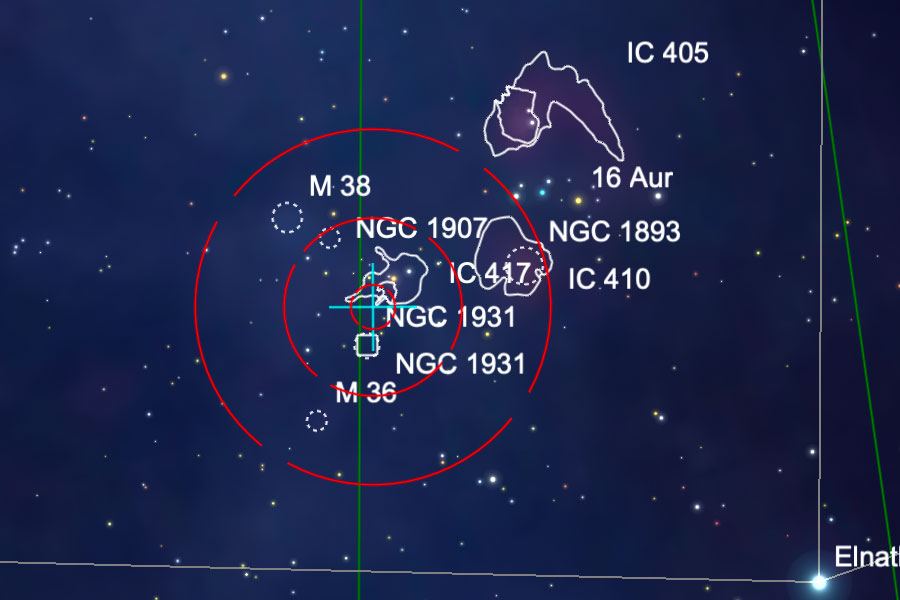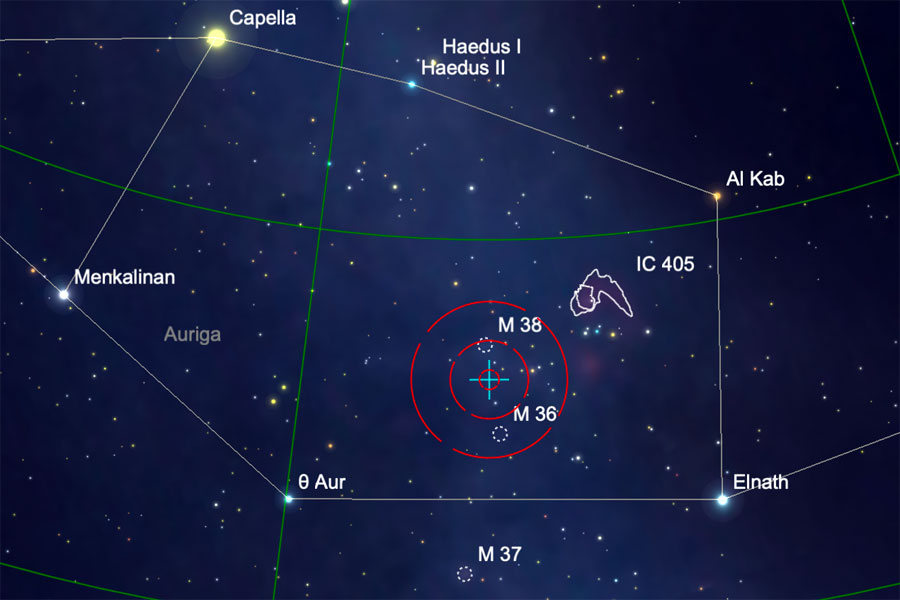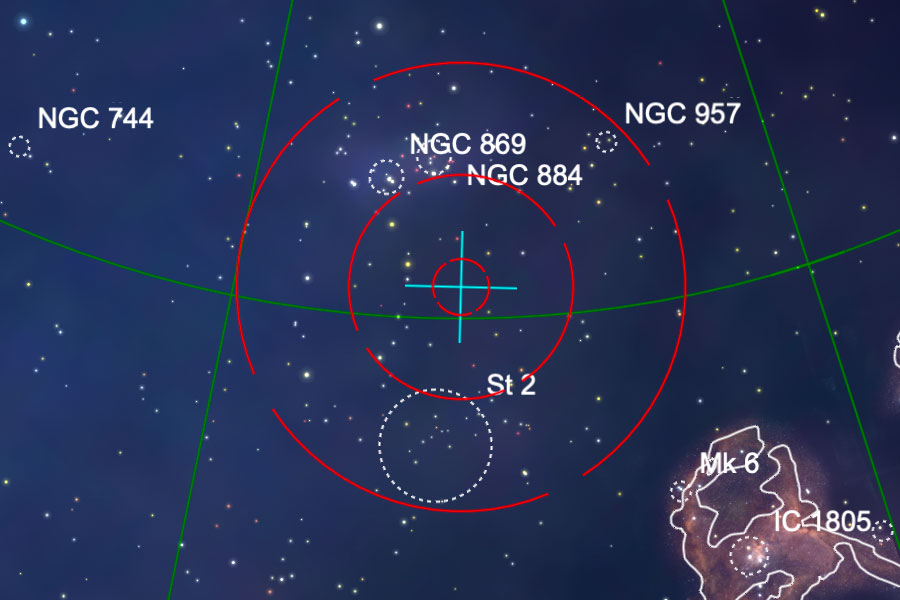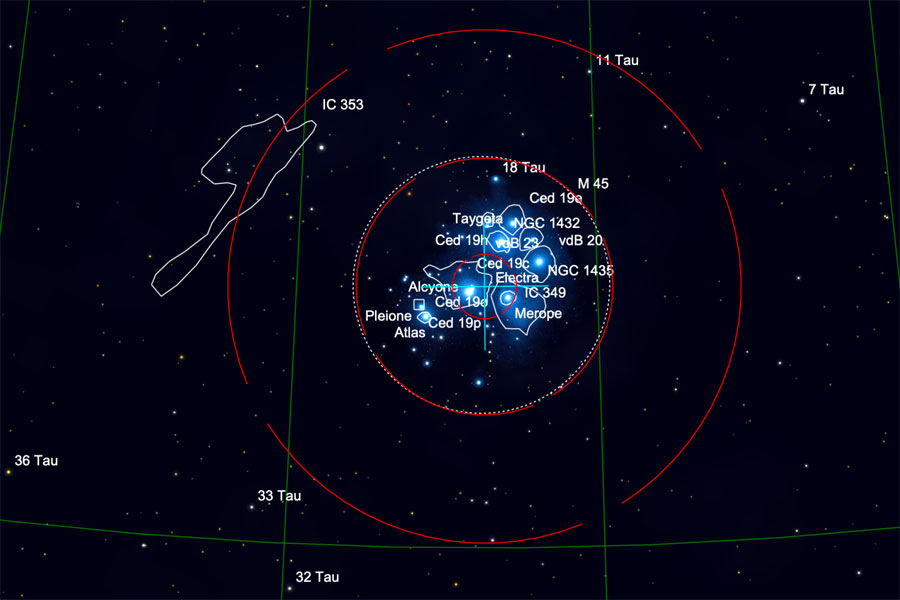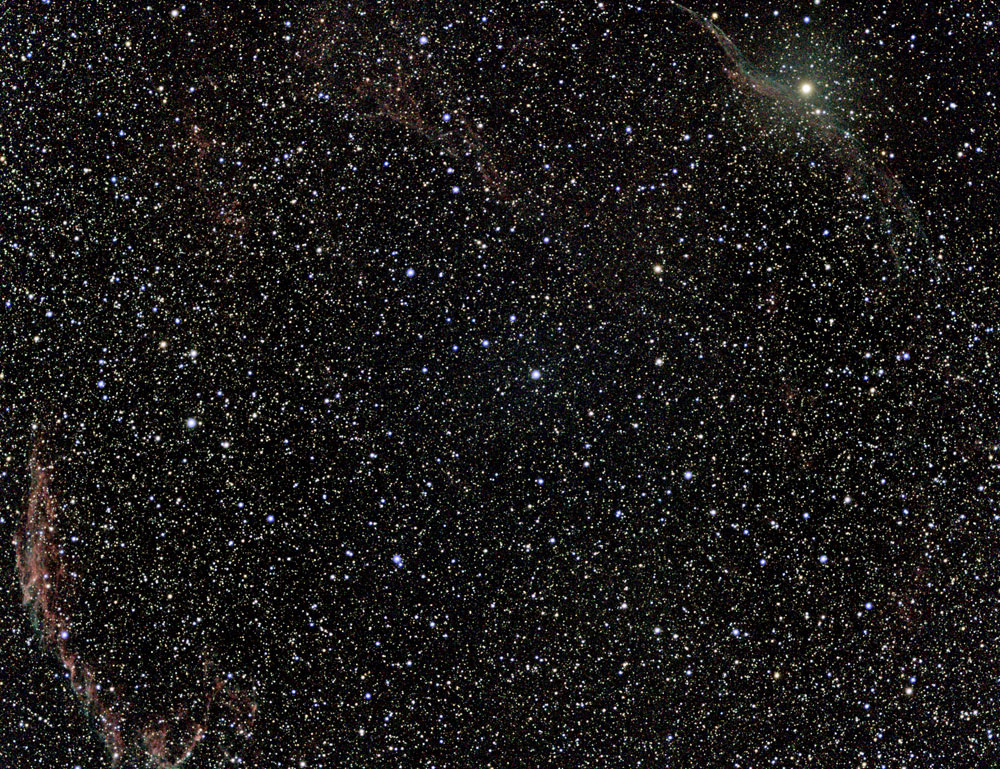DSO List (Rich-Field Objects)
Introduction | Introduction | Overview of Rich-Field Objects | References
I compiled the following list of rich-field objects* using the Deep Sky Reiseatlas (Stoyan/Feiler & Noack; see references).
*) Rich-field (deep sky) objects denote in the case of my list:
- large DSO of an extension of more than 1.5° and
- at least two DSO, which are located within a field of view of up to about 4° and thus, can be observed together with corresponding telescopes (low magnification, large field of view).
This list should help me - and maybe others - to select rich-field DSO for observation. The rankings from the Deep Sky Reiseführer/Reiseatlas can be a further help when selecting the objects.
Introduction
At the beginning of December 2019, a starfriend of mine had suggested in a forum of the astronomie.de Website to create a list of rich-field DSO, in order to be able to observe these objects specifically with his "rich-field telescope." This includes on the one hand large DSO, which can also be larger than the field of view of a telescope, and on the other hand several DSO, which can be observed together in the same large field of view. It was not exactly defined and also depends on the equipment available, how large the field of view actually should be. Many astronomers have contributed objects to the discussion from their own experience, so that the list grew and grew.
I, however, decided not to participate in this discussion, and to go my own way. This is to browse the Deep Sky Reiseatlas (Stoyan/Feiler & Noac) page by page for DSO that fit into a field of view of about 4° (the Telrad circles in the atlas helped me here) and can thus be observed together. I left out or added to the list one or the other object that did not exactly match these criteria. Certainly, I also made some mistakes, which I hope to be able to correct in the course of time.
First of all, I created an Excel list, because this allows to filter the list according to certain criteria and thus, to find specific information more easily. Nevertheless, I also created a static HTML table for my Website to make the list accessible to others, even if I have to correct the list manually again and again...
Examples
The following examples are intended to illustrate the principle, but were created by me with the SkySafari 6 application for copyright reasons. The red rings are the Telrad circles (0.5°, 2° and 4°).
(Images Courtesy of SkySafari Astronomy, www.simulationcurriculum.com)
Note: Definitely it would be nicer if I showed maps for the groupings listed below, but that was too much work for me. If you have an astronomy application that can display the Telrad circles, you can easily help yourself by searching for one of the objects within a group in the application. Once the object has been found, the field of view can be shifted so that all objects fit optimally into the field of view of 4° (or 2°).
Eyepiece Selection
In the following, I list the data of my telescopes that are "just so" suited to rich-field and long focal length eyepieces. The TLAPO1027 and the Explorer 150PDS, which I sold both, can perhaps still be considered as "rich field" telescopes, the Celestron C5 with reducer/corrector with a maximum FOV of 2° probably just so (it is sufficient for the Pleiades M 45).
| Telescope | Further Data |
Focal Length of Eyepiece (mm) |
||||||
| Magnification | ||||||||
Focal Length of Telescope (mm) |
16 |
24 |
26 |
32 |
35 |
40 |
56 |
|
| PS 72/432 | 432 |
27.00 |
18.00 |
16.62 |
13.50 |
12.34 |
10.80 |
7.71 |
| TLAPO1027 | 714 |
44.63 |
29.75 |
27.46 |
18.75 |
17.14 |
15.00 |
10.71 |
| 150PDS | 750 |
46.88 |
31.25 |
28.85 |
23.44 |
21.43 |
18.75 |
13.39 |
| C5R | 787.5 |
49.22 |
32.81 |
--- |
24.61 |
--- |
--- |
--- |
| True Field of View (°) | ||||||||
Apparent Field
of View (°) > |
82 |
65 |
70 |
52 |
69 |
68 |
52 |
|
Focal Length of Telescope (mm) |
16 |
24 |
26 |
32 |
35 |
40 |
56 |
|
| PS 72/432 | 432 |
3.04 |
3.61 |
4.21 |
3.85 |
5.59 |
6.30 |
6.74 |
| TLAPO1027 | 714 |
1.84 |
2.18 |
2.55 |
2.33 |
3.38 |
3.92 |
4.08 |
| 150PDS | 750 |
1.75 |
2.08 |
2.43 |
2.22 |
3.22 |
3.63 |
3.88 |
| C5R | 787.5 |
1.67 |
1.98 |
--- |
2.11 |
--- |
--- |
--- |
| Exit Pupil (mm) | ||||||||
Focal Ratio |
16 |
24 |
26 |
32 |
35 |
40 |
56 |
|
| PS 72/432 | 6 |
2.67 |
4.00 |
4.33 |
5.33 |
5.83 |
6.67 |
9.33 |
| TLAPO1027 | 7 |
2.29 |
3.43 |
3.71 |
4.57 |
5.00 |
5.71 |
8.00 |
| 150PDS | 5 |
3.20 |
4.80 |
5.20 |
6.40 |
7.00 |
8.00 |
11.20 |
| C5R | 6.3 |
2.58 |
3.87 |
--- |
5.16 |
--- |
--- |
--- |
Italic: 2" eyepiece; Gray: no longer in my possession
Conclusion: I achieve a FOV of about 4° with the PS 72/432 using the 26 mm-2" eyepiece; with the C5R I only achieve a FOV of about 2° at maximum.
EAA
Rich field observation is not possible with the eVscope (2). The situation is different with the Vespera (sold), however, since it has been equipped with the possibility of recording mosaics. Here is a summary of the mosaic characteristics for the Vespera (from the CovalENS article):
- Native field of view of the telescope: 1.6° x 0.9°
- Extended field max. size (sensor ratio): 3.2° x 1.8°
- Extended field max. size (square): 2.4° x 2.4°
- Extended field max. size (horizontal): 3.6° x 1.6°
- Extended field max. size (vertical): 0.9° x 6.4°
- Extended field max. definition (file size): 8.2 Mpx
Overview of Rich-Field Objects
Notes: An object group always starts with the first object of a constellation and ends before the next constellation. Not all objects in a group may belong to the same constellation. In such a case, I added the corresponding constellation in brackets.
I have already observed quite a number of DSO individually and note this in the table below; I also note when I observed objects with the StarTravel 120/600, which I had borrowed in autumn 2019.
| Constellation | Number | Name | Type | Rank. | Size | Remarks | Observed Alone | Observed Together, Photos | Page* |
| Cam | Kemble's Cascade | SP | *** | 2.8° | ST120 | Vesp: NGC 1502/KC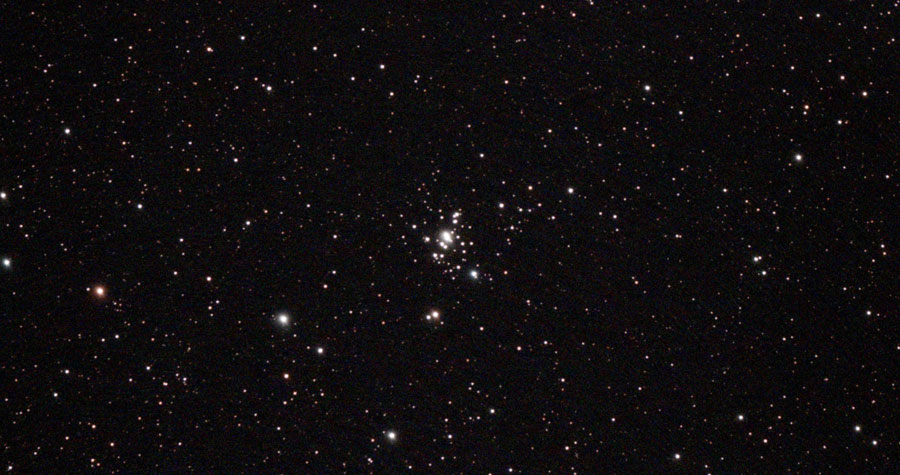 |
1, 2, 3 | ||
| NGC 1502 | Golden Harp Cluster | OC | ** | 7' | At the end of Kemble's Cascade | ||||
| Dra | NGC 6543 | Cat's Eye Nebula | PN | *** | 0.3' | very small | eVs | eVs: Cat's Eye Nebula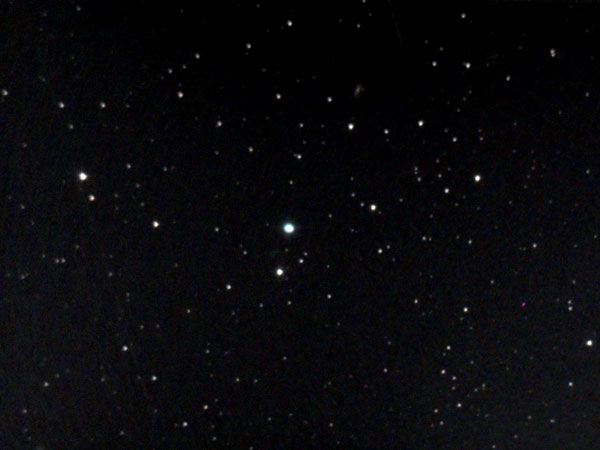 |
1 |
| NGC 6503 | G | * | 4' x 1' | ||||||
| And | M 31 | Andromeda Galaxy | G | ***** | 3° x 1° | Often seen as single object | BI, ST120, eVs(2), Vesp (Pro) | Vesp (mosaic): M 31/32/110 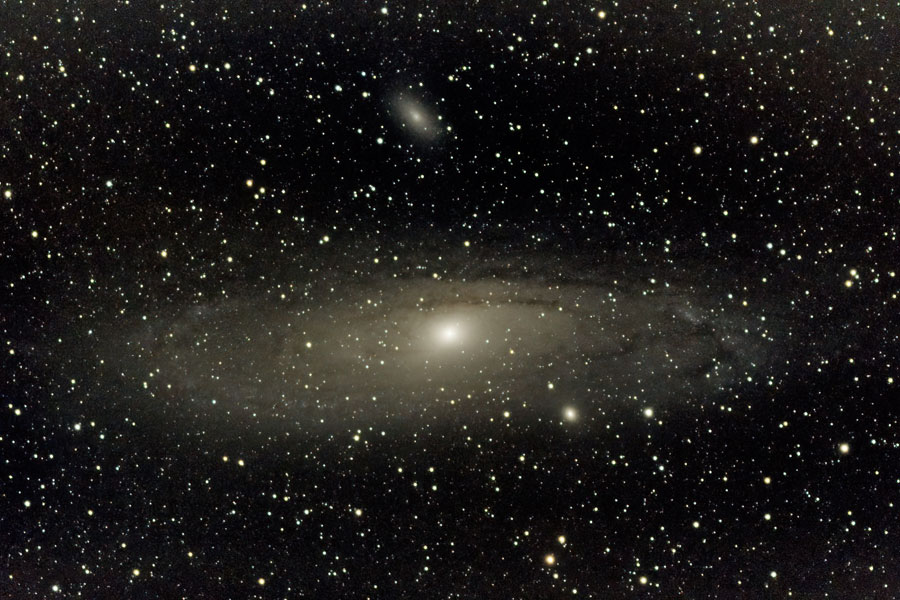 |
2, 8 |
| M 32 | G | ** | 4' x 3' | Companion of M 31 | with 31; see there | ||||
| M 110 | G | ** | 10' x 15' | Companion of M 31 | eVs, Vesp (Pro) | ||||
| Per | Mel 20 | Perseus Moving Cluster | OC | ** | 3° | Single object | yes | Vesp, BI | 2, 3 |
| Per | NGC 884/869 | Perseus Double Cluster | OC | **** | 25', 20' | BI, ST120, eVs(2), Vesp (Pro) | Vesp, BI; double cluster with "Oval"; not seen together with St 2
 |
2 | |
| "Oval" | SM | ? | My own star pattern | ST120, BI | |||||
| (Cas) | St 2 | Muscle Man | OC | ** | 80' | Not easy to find | yes, BI | ||
| Cas | NGC 896 | GN | * | 24' x 22' | near IC 1805 | Vesp (Pro) | Vesp (mosaic): NGC 896, IC1795, IC 1805
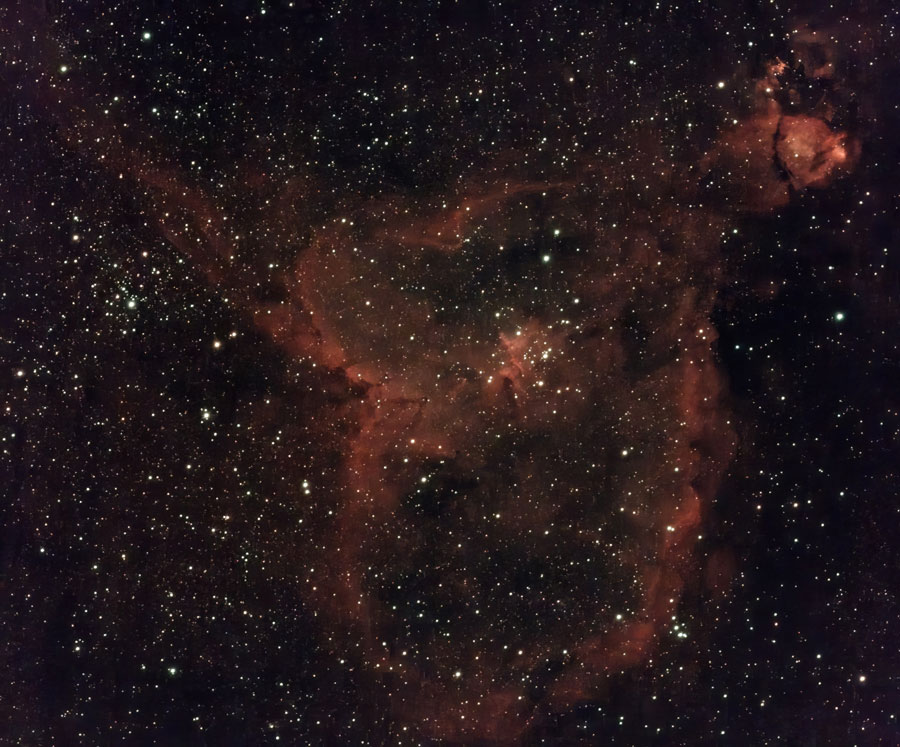 Vesp (mosaic): IC 1848 Vesp (mosaic): IC 1848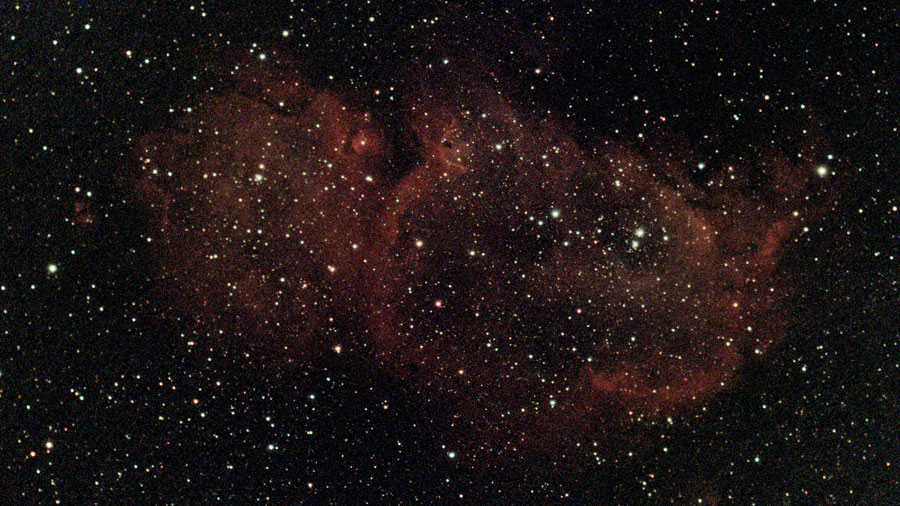 |
2 | |
| IC 1805 | Heart Nebula | GN | * | 1.5° x 1° | eVs(2), Vesp (Pro) | ||||
| IC 1848 | Soul Nebula | GN | * | 1.5° x 0.5° | eVs(2), Vesp (Pro) | ||||
| Cas | M 103 | OC | *** | 6' | ST120, eVs, Vesp (Pro) | Vesp: M 103, NGC 654, NGC 659, NGC 663 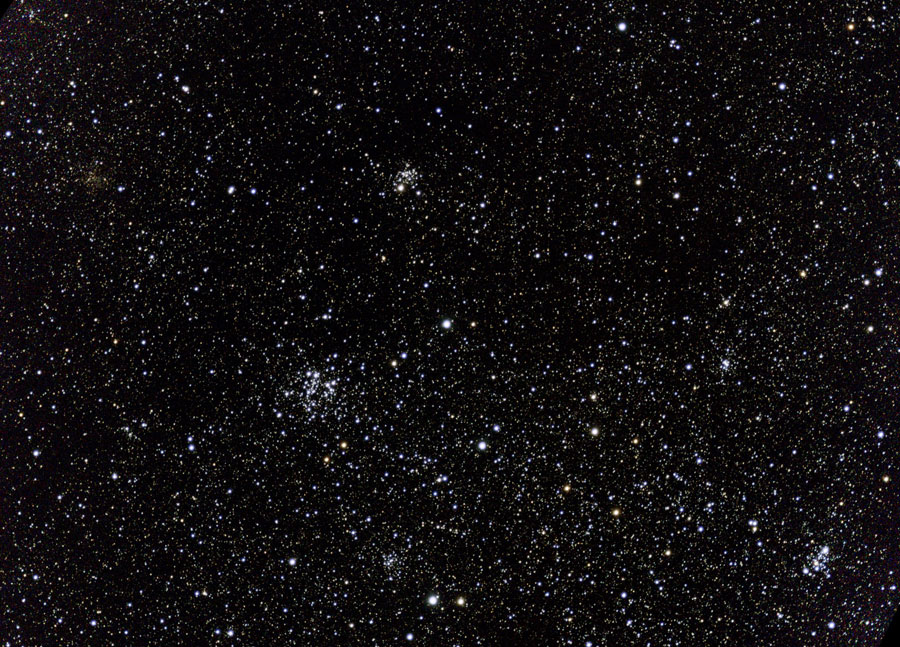 Eval. with astrometry.net |
2,7 | ||
| NGC 663 | Letter S Cluster | OC | ** | 15' | ST120, eVs, Vesp (Pro) | ||||
| NGC 654
+ NGC 659 |
OC | * | 5' x 3' | Vesp (Pro) | |||||
| Cas | M 103 | OC | *** | 6' | ST120, eVs, Vesp (Pro) | Vesp: NGC 457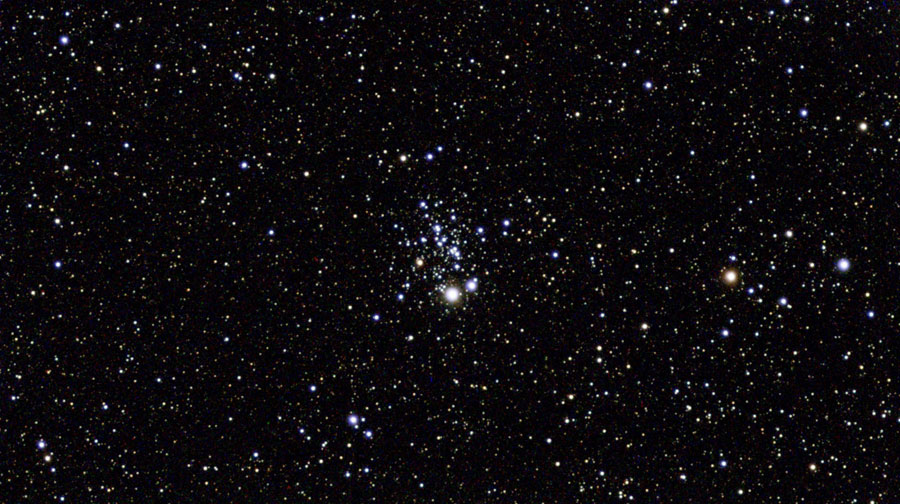 |
2 | ||
| NGC 457 | E.T./Owl Cluster | OC | *** | 15' x 10' | ST120, eVs, Vesp (Pro) | ||||
| Cas | M 52 | OC | *** | 10' | eVs, Vesp (Pro) | Vesp: M 52, NGC 7635 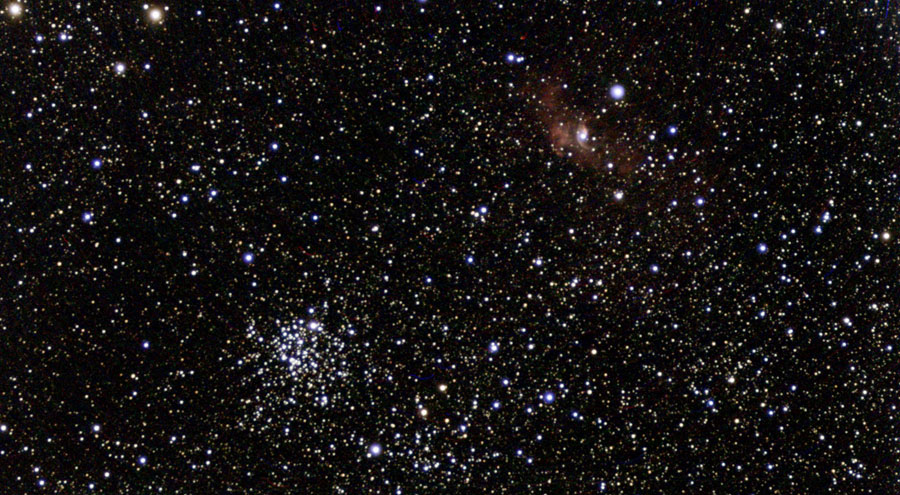 |
2, 7 | ||
| NGC 7635 | Bubble Nebula | GN | * | 1' | Small | eVs, Vesp (Pro) | |||
| (Cep) | NGC 7510 | OC | ** | 3' | |||||
| (Cep) | NGC 7538 | GN | 1,5' | Small | |||||
| UMa | M 81 | Bode Galaxy | G | **** | 12' x 5' | ST120, eVs, Vesp (Pro) | Vesp: M 81/82; M 81, NGC 3077 composite: 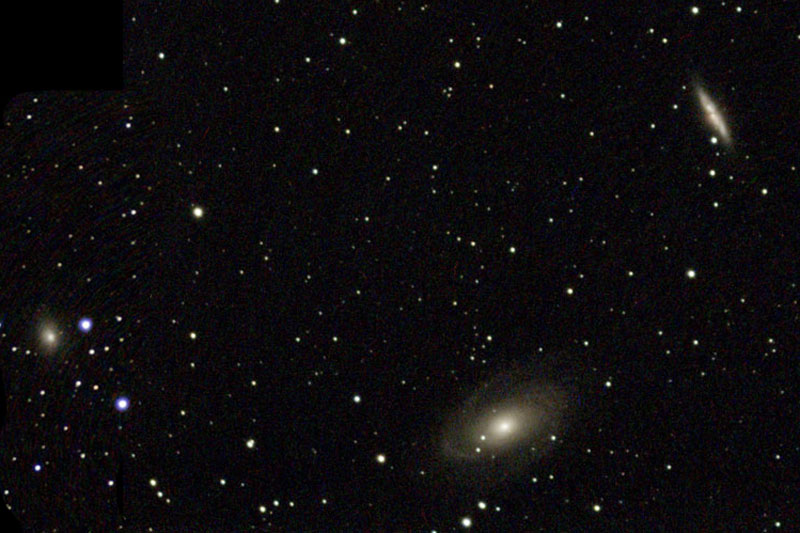 |
4 | |
| M 82 | Cigar Galaxy | G | **** | 6' x 2' | ST120, eVs, Vesp (Pro) | ||||
| NGC 3077 | G | * | 2' | Companion of M 81 | Vesp (Pro) | ||||
| NGC 2976 | G | 2.5' x 1.5' | Companion of M 81 | ||||||
| UMa | M 97 | Owl Nebula | PN | ** | 3,3' | eVs(2), Vesp (Pro) | Vesp: M 97, M 108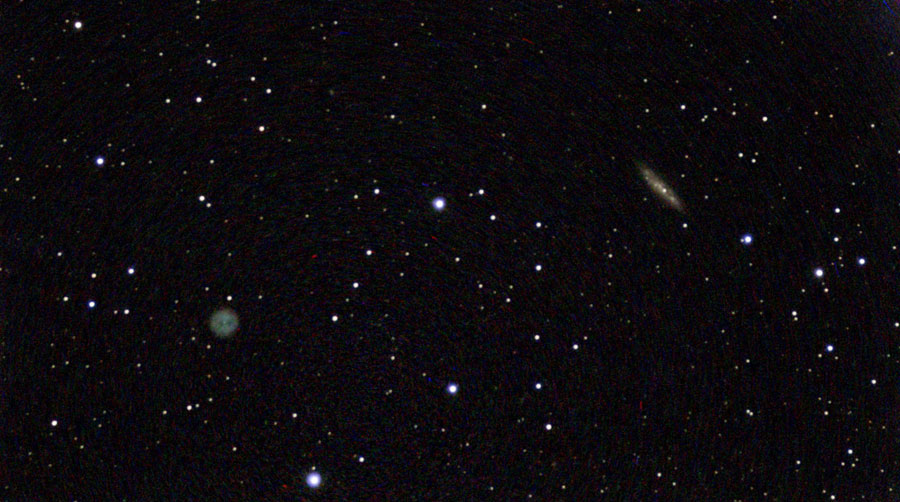 |
4, 5 | |
| M 108 | G | ** | 5' x 1.5' | See from the side | eVs, Vesp (Pro) | ||||
| Cep | NGC 6939 | OC | * | 7' | Vesp | Vesp: NGC 6939, 6949 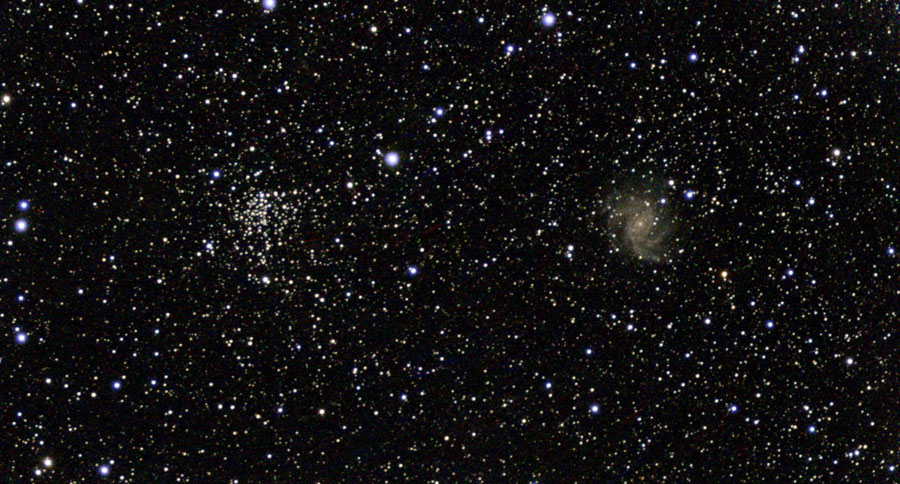 |
6, 7 | ||
| NGC 6946 | Fireworks Galaxy | G | * | 10' | eVs, Vesp | ||||
| Tau | M 45 | Pleiades, Seven Sisters | OC | ***** | 1,8° x 1,2° | Single object | ST120, eVs(2), Vesp (Pro) | Too large for eVs(2) and Vesp Vesp (mosaic): M 45 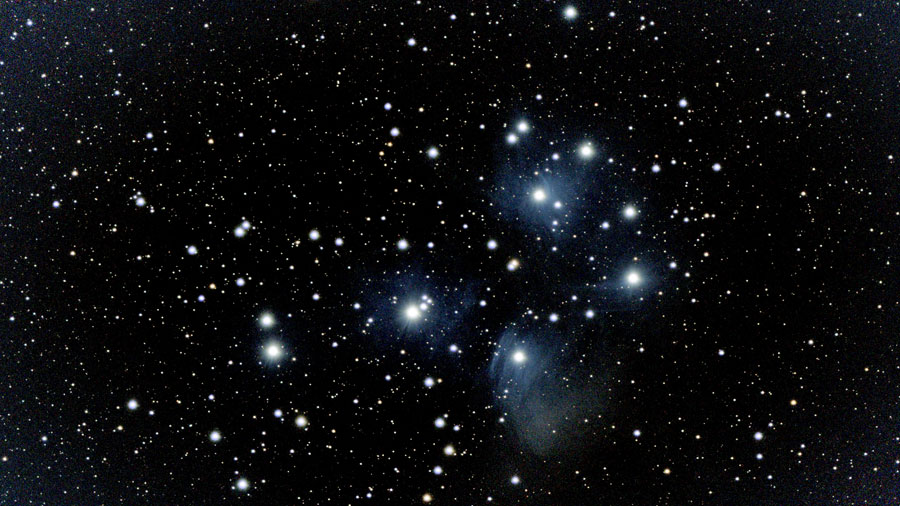 |
9 |
| Tau | Mel 25 | Hyades | OC | *** | 5° x 4° | Single object | yes, Vesp | Too large for eVs(2) and Vesp Vesp (mosaic): Mel 25 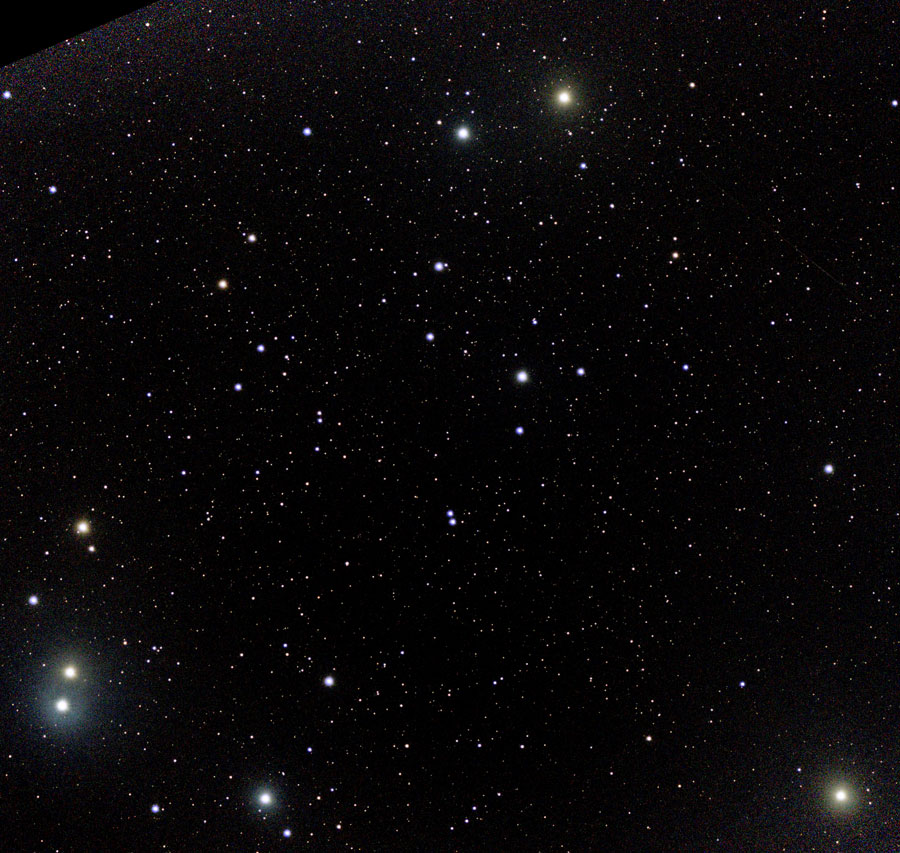 |
9, 19 |
| Per | NGC 1499 | California Nebula | GN | * | 2,5° x 0,8° | Single object | eVs2 (nothing), Vesp (Pro) | Vesp (mosaic): NGC 1499 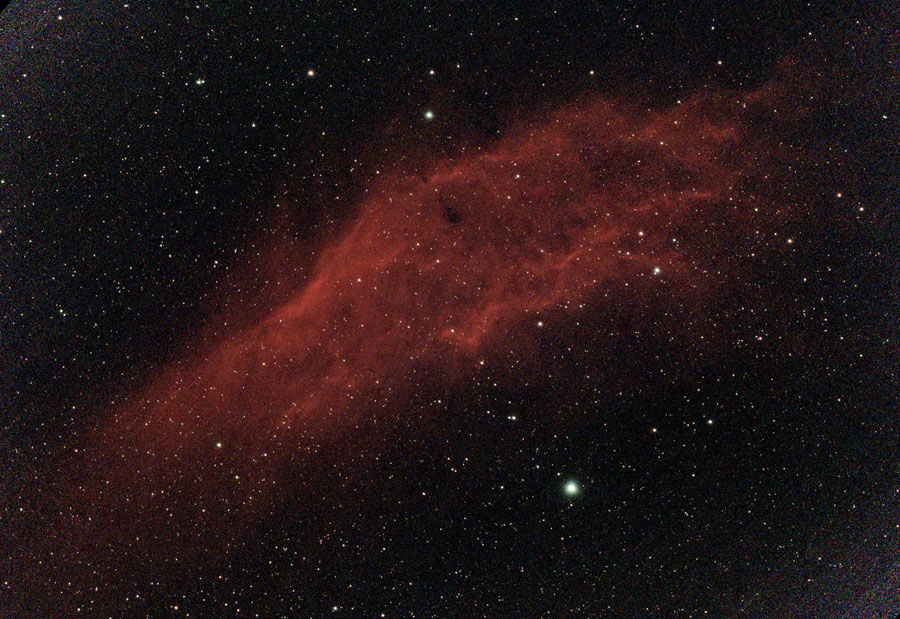 |
9 |
| Aur | M 36 | OC | *** | 12' | yes, eVs(2), Vesp (Pro) | Vesp (mosaic): M 36/38 & more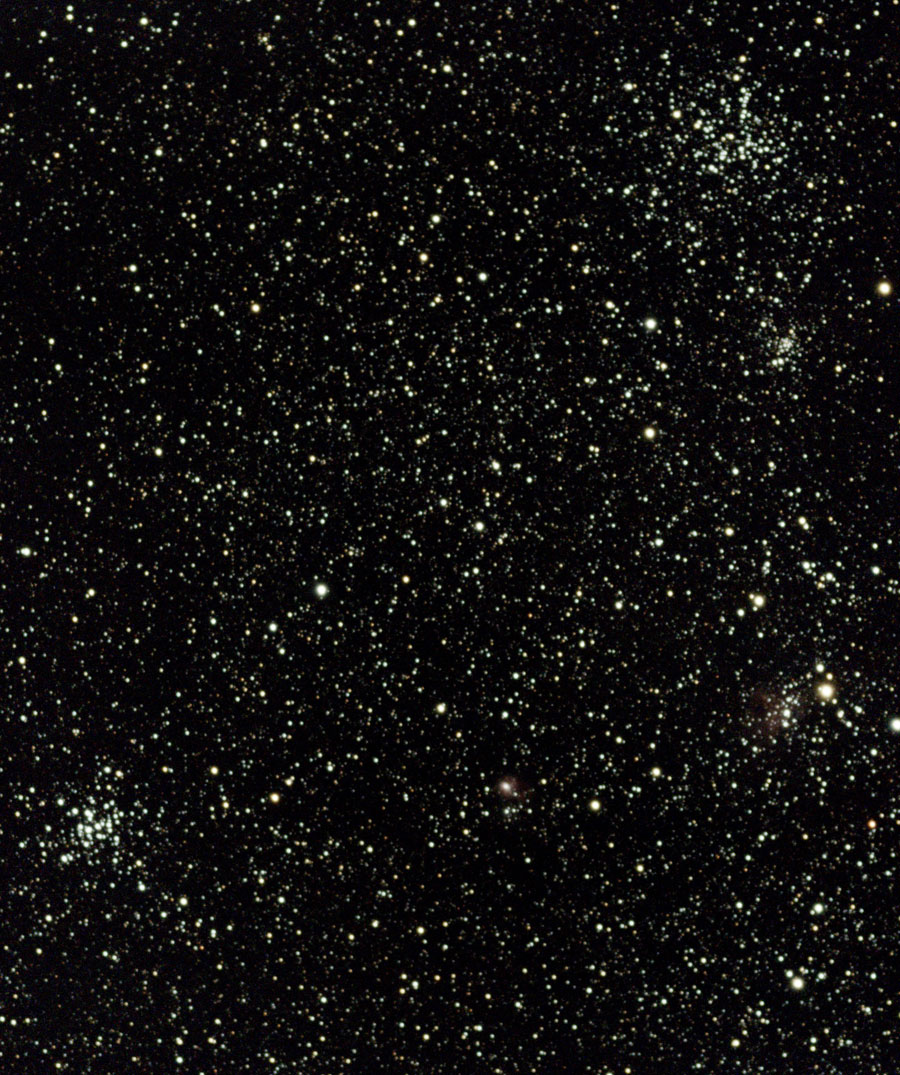 Eval. with astrometry.net |
9, 10 | ||
| M 38 | OC | *** | 25' | yes, eVs(2), Vesp (Pro) | |||||
| NGC 1907 | OC | * | 4' | Vesp (Pro) | |||||
| NGC 1931 + IC 417 | GN | * | 1' | Vesp | |||||
| Gem | M 35 | OC | **** | 28' | yes, ST120, eVs(2), Vesp (Pro) | Vesp: M 35, NGC 2158 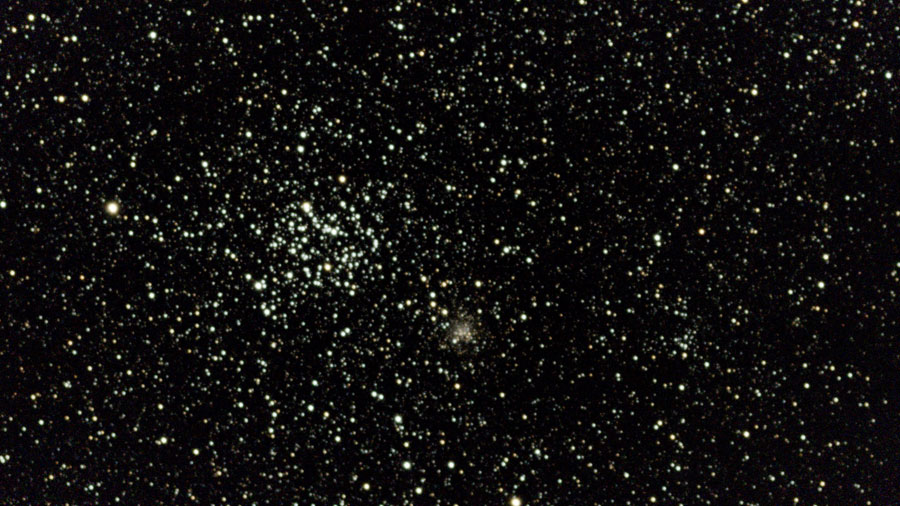 |
9, 10 | ||
| NGC 2158 | OC | 2.5' | Close to M 35 | Vesp (Pro) | |||||
| Gem | NGC 2420 | OC | ** | 8' | eVs: NGC 2392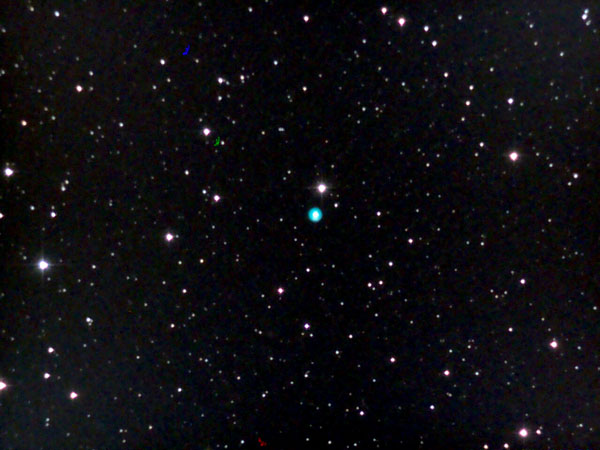 |
10 | |||
| NGC 2392 | Eskimo Nebula | PN | *** | 0,8' | eVs, Vesp (Pro) | ||||
| Leo | M 65 | Leo Galaxy Triple | G | ** | 5' x 1.5' | yes, eVs, Vesp (Pro) | eVs(2): M 65, M 66 eVs2: M 65, NGC 3628 Vesp: M 65, M 66, NGC 3628 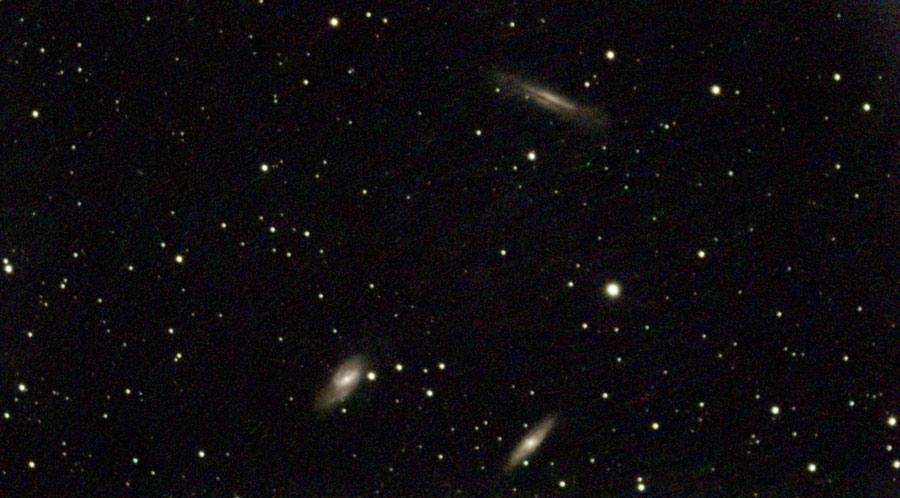 | 11, 19 | |
| M 66 | Leo Galaxy Triple | G | ** | 4.5' x 2' | yes, eVs, Vesp (Pro) | ||||
| NGC 3628 | Leo Galaxy Triple | G | * | 8' x 2' | eVs(2), Vesp (Pro) | ||||
| Com | Mel 111 | Coma Cluster | OC | *** | 3.5° | Single object | yes | 12 | |
| Com | M 53 | GC | ** | 4'/12.6' | eVs, Vesp Pro | Vesp Pro : M 53 and NGC 5053 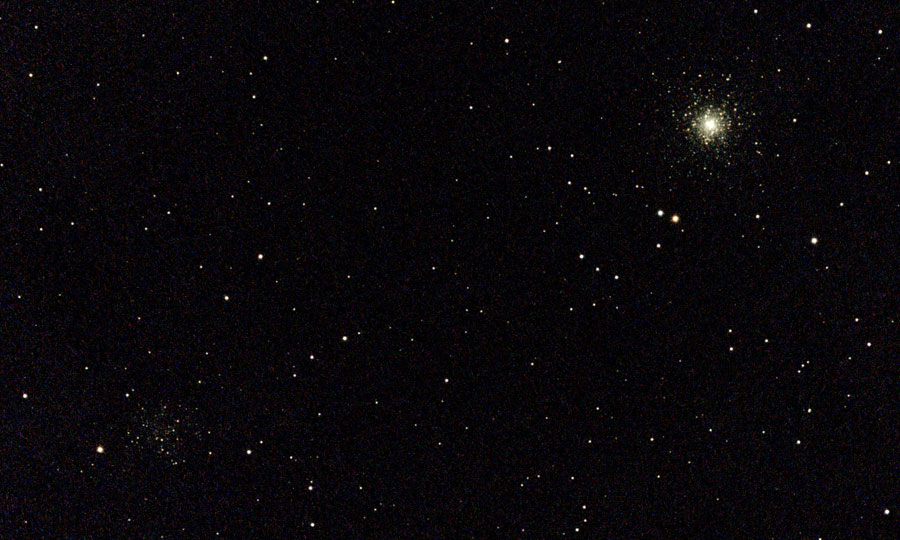 |
12 | ||
| NGC 5053 | GC | 10' | 1° east of M 53 | Vesp Pro | -- | ||||
| Vir | M 84 | G | * | 1,5' | eVs(2), Vesp (Pro) | Vesp Pro : Great Galactic Face 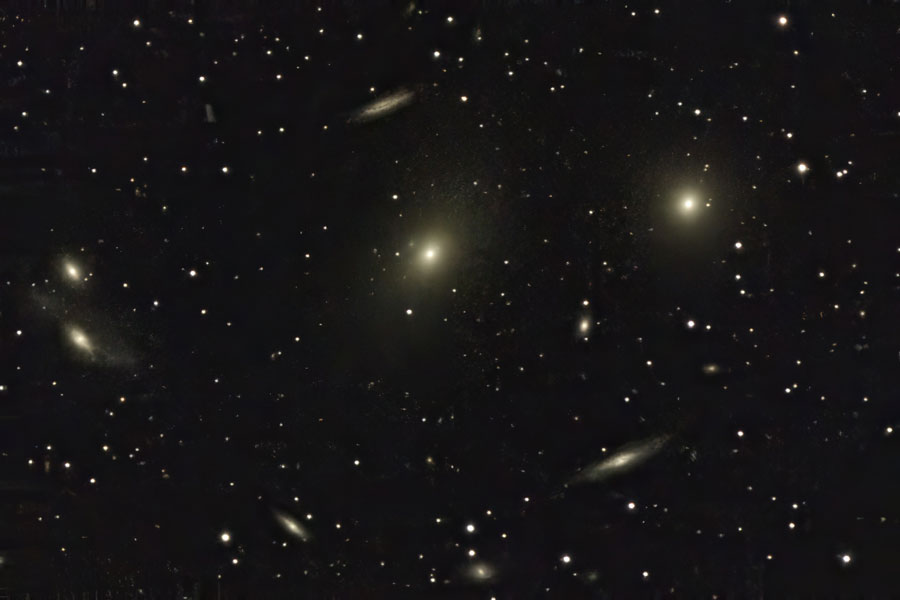 Vesp Pro: Markarian's Chain 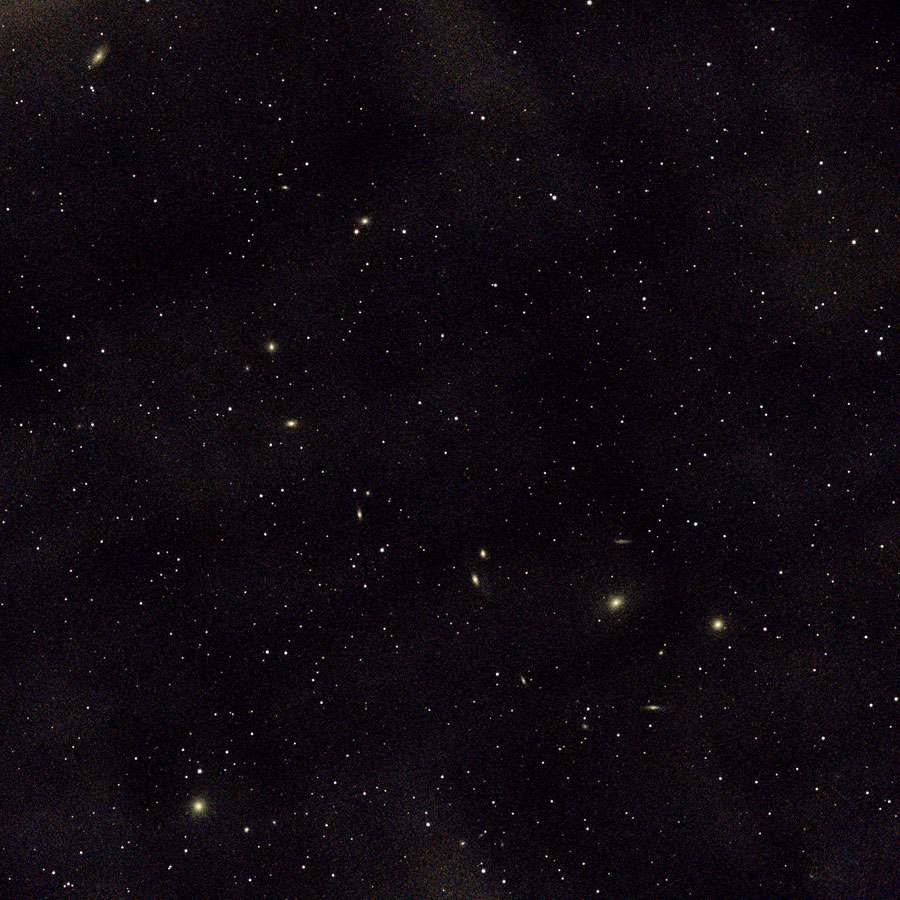 |
12, 20 | ||
| M 86 | G | * | 2' | eVs(2), Vesp (Pro) | |||||
| Surround | Too many to list here... | G | div. | Vesp (Pro) | |||||
| M 87 | G | ** | 3' | yes, eVs, Vesp (Pro) | |||||
| Vir | M 98 | G | * | 5' x 2' | eVs, Vesp Pro | eVs: M 98 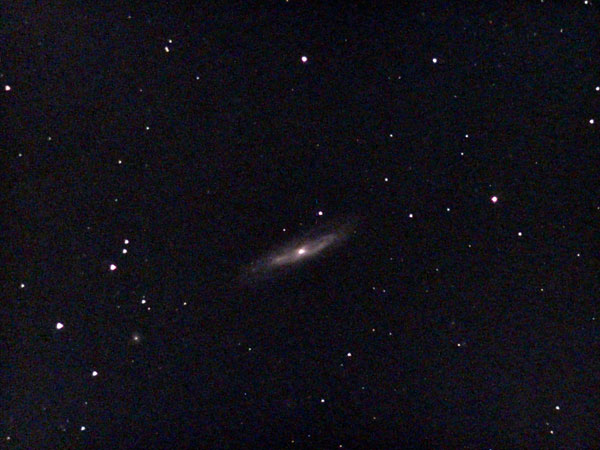 |
12, 20 | ||
| Surround | Too many to list here... | G | div. | ||||||
| Vir | M 91 | G | * | 2' x 1.5' | eVs, Vesp Pro | eVs: M 91 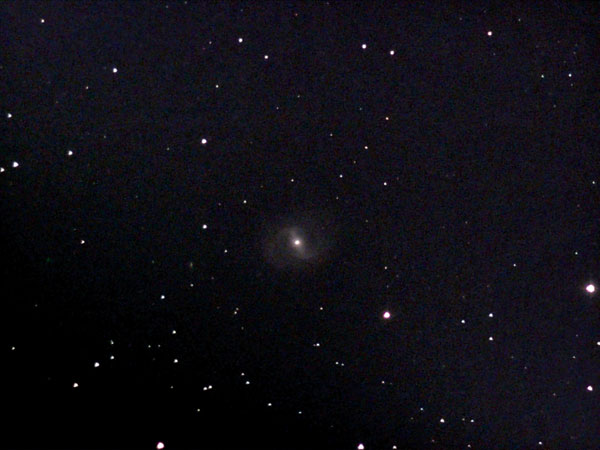 |
12, 20 | ||
| Surround | Too many to list here... | G | div. | ||||||
| Cyg | M 29 | OC | *** | 6' | yes, eVs, Vesp | Vesp Pro: M 29 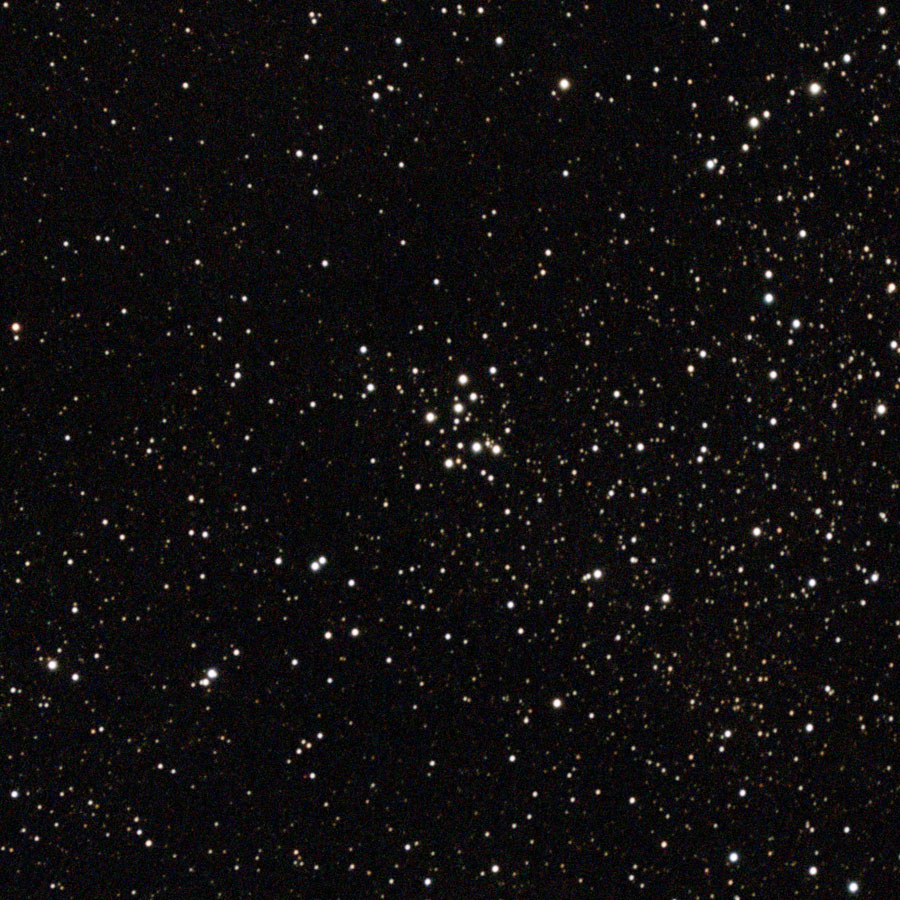 |
14 | ||
| IC 1318 | GN | * | 50' x 40' | ||||||
| Cyg | NGC 6960 | Cirrus Nebula, western part | GN | *** | 45' x 5' | eVs(2), Vesp (Pro) | 14, 15 | ||
| NGC 6992/5 | Cirrus Nebula, eastern part | GN | *** | 55' x 5' | eVs(2), Vesp (Pro) | ||||
| And | NGC 7662 | PN | ** | 0,5' | eVs | eVs: NGC 7662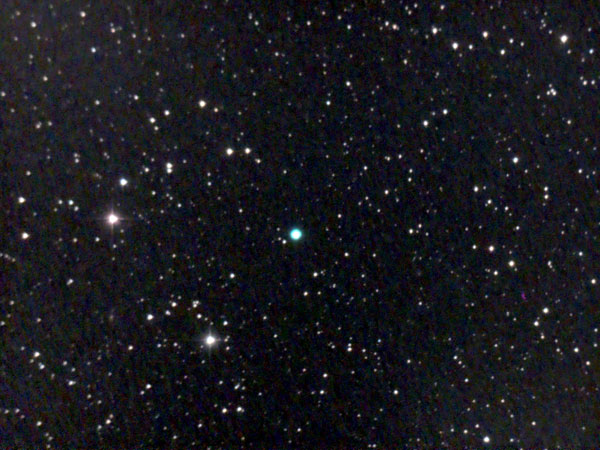 |
15 | ||
| NGC 7640 | G | * | 4' x 1' | eVs | |||||
| Ori | M 42/43 | Orion Nebula | GN | **** | 25' x 30' | yes, ST120, eVs(2), Vesp (Pro) | eVs(2), Vesp, other... Vesp (mosaic): M 42/43, NGC 1977, NGC 1980 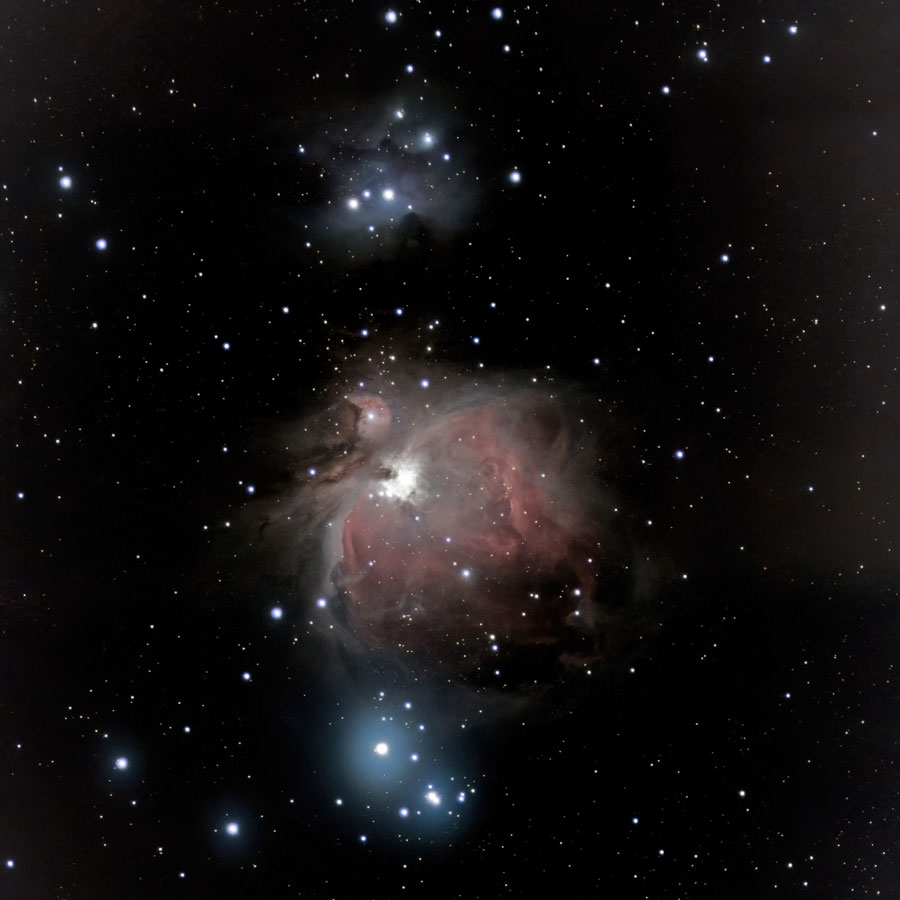 |
17 | |
| Surround | NGC 1977, NGC 1980 | div. | div. | eVs(2), Vesp (Pro) | |||||
| Ori | IC 434 | GN | * | 44' x 10' | Includes B 33 | eVs(2), Vesp (Pro) | Vesp (mosaic): B 33, IC 434, NGC 2024
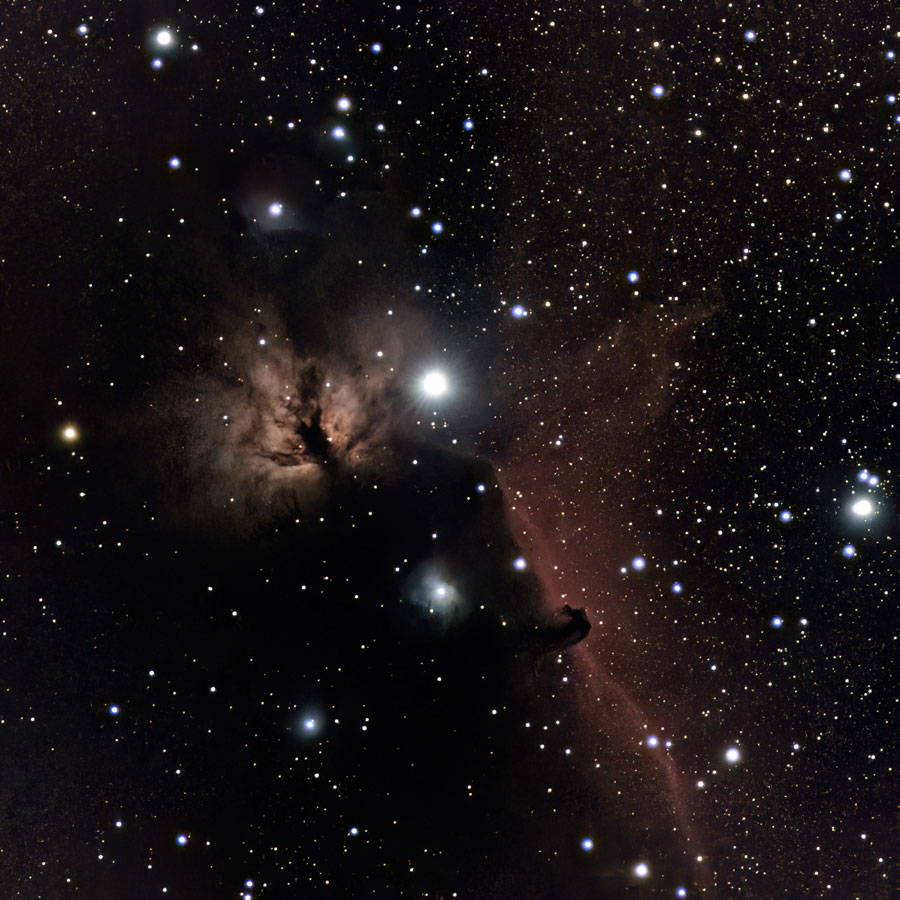 |
17 | |
| B 33 | Horse Head Nebula | GN | * | 4' | eVs(2), Vesp (Pro) | ||||
| NGC 2024 | Flame Nebula | GN | ** | 20' x 15' | eVs(2), Vesp (Pro) | ||||
| M 78 | GN | * | 5' x 4' | eVs(2), Vesp (Pro) | Vesp: M 78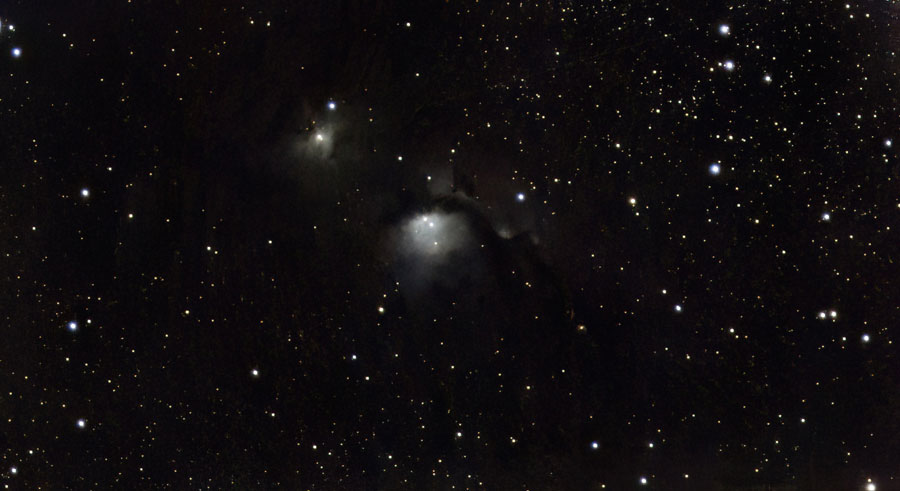 |
||||
| Pup | M 46 | OC | *** | 20' x 15' | yes, eVs, Vesp (Pro) | Vesp: M 46/47 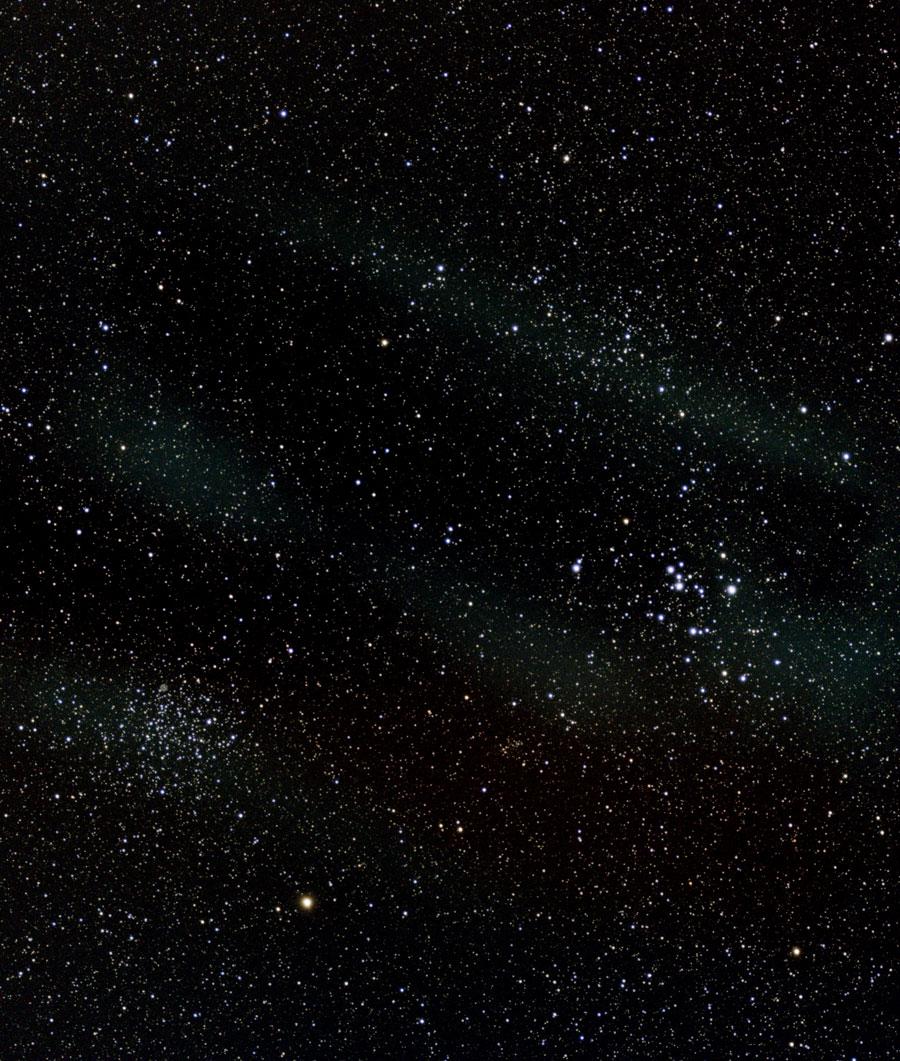 Ausw. mit astrometry.net |
18, 26 | ||
| M 47 | OC | *** | 30' x 20' | yes, eVs, Vesp (Pro) | |||||
| NGC 2438 | PN | * | 1.1' | eVs, Vesp (Pro) | |||||
| NGC 2423 + NGC 2425 | OC | * | 15' | Vesp (Pro) | |||||
| Leo | M 95 | M 96 Galaxy Group | G | * | 4' x 3.5' | eVs(2), Vesp (Pro) | Vesp: M 95, M 96, M 105, NGC 3386, NGC 3389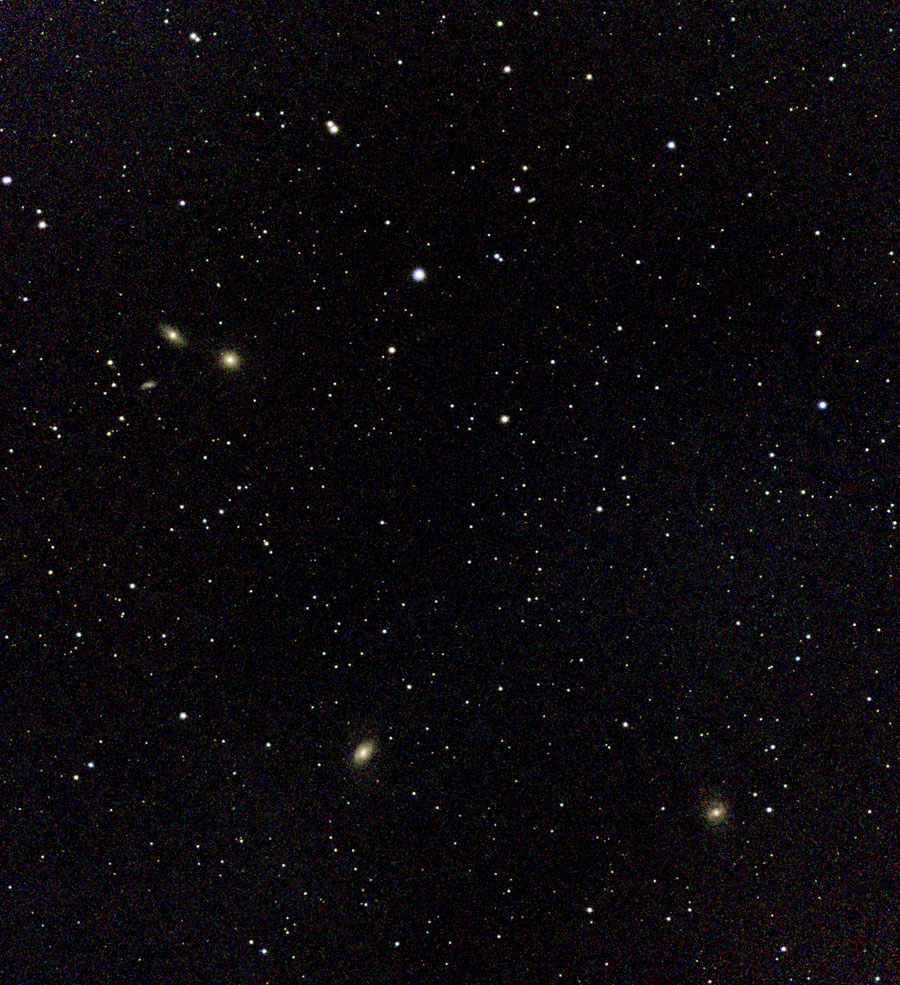 Ausw. mit astrometry.net | 19 | |
| M 96 | M 96 Galaxy Group | G | * | 3.5' x 3' | yes, eVs(2), Vesp (Pro) | ||||
| M 105 | M 96 Galaxy Group | G | * | 2.5' x 2' | eVs(2), Vesp (Pro) | ||||
| NGC 3384
+ NGC 3389 |
M 96 Galaxy Group | G | * | 2.5' x 2' | eVs, Vesp (Pro) | ||||
| Oph | M 10 | OC | ** | 8' | ST120, eVs, Vesp (Pro) | Vesp: M 10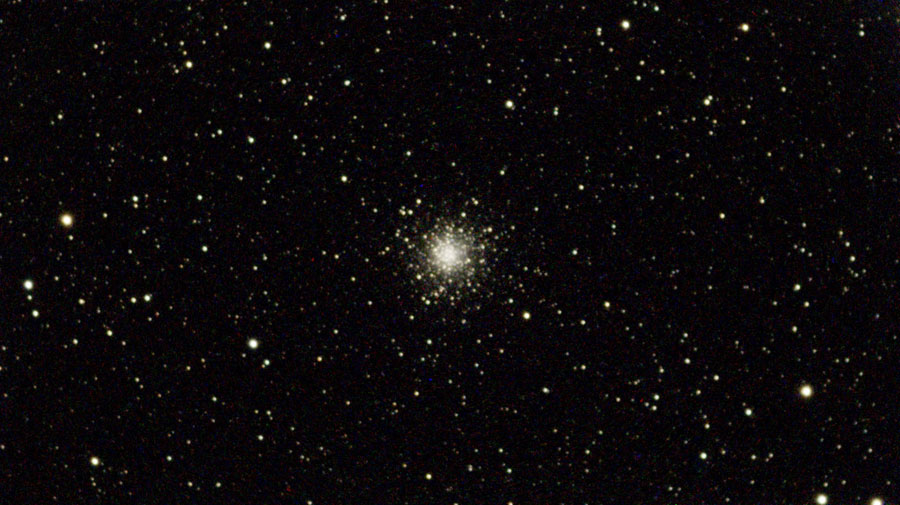 |
21 | ||
| M 12 | OC | ** | 5' | ST120, eVs, Vesp (Pro) | Vesp: M 12 |
||||
| Aqu | M 72 | GC | ** | 3' | eVs | eVs: M 72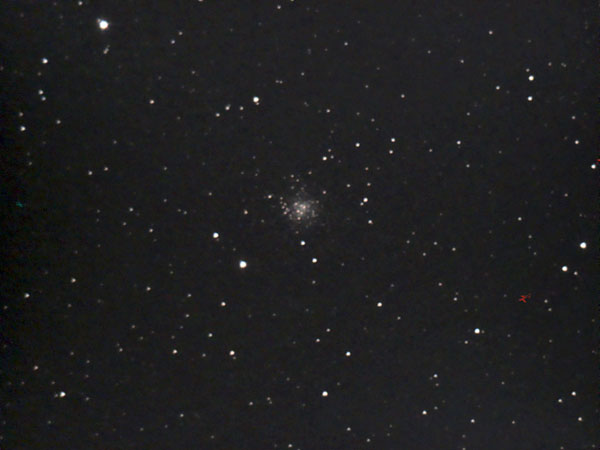 |
22, 23, 31 | ||
| M 73 | SM | * | 1' | eVs | |||||
| NGC 7009 | Saturn Nebula | PN | ** | 0,4' | Very small | eVs | |||
| Del | Rhombus of the Dolphin | yes | 22 | ||||||
| Sct | M 11 | Wild Duck Cluster | OC | **** | 7' | ST120, eVs(2), Vesp (Pro) | Vesp: M 11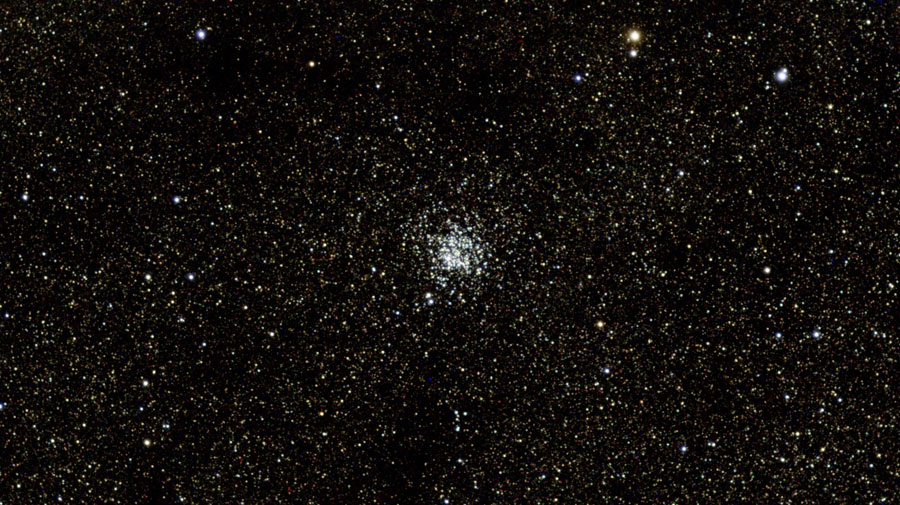 |
22 | |
| B 111 | Dark Nebula | 1.8° x 1° | |||||||
| NGC 6751 | PN | 0.3' | Small, ring | eVs | |||||
| B 133 | Dark Nebula | 10' | |||||||
| Sct | M 11 | Wild Duck Cluster | OC | **** | 7' | ST120, eVs(2), Vesp (Pro) | eVs: M 26 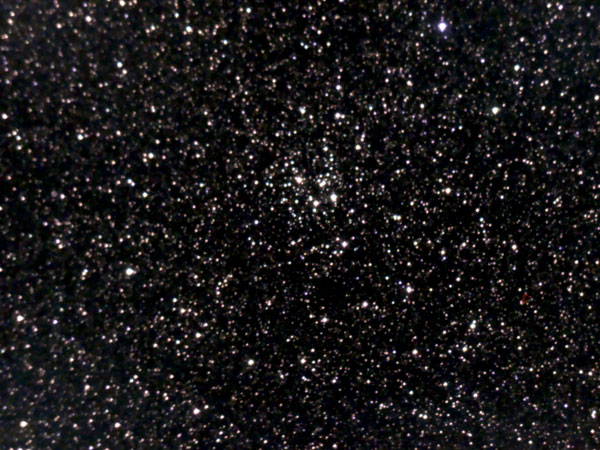 Vesp: NGC 6712 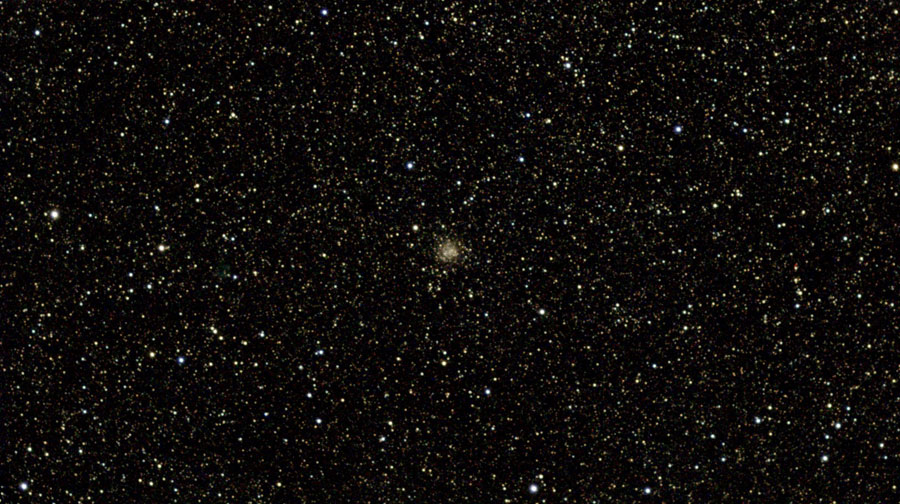 |
22 | |
| M 26 | OC | * | 8' | ST120, eVs(2), Vesp | |||||
| NGC 6712 | GC | 2.5' | eVs, Vesp | ||||||
| IC 1295 | PN | 1.5' | |||||||
| Oph | IC 4756 | OC | * | 70' | eVs | eVs: IC 4756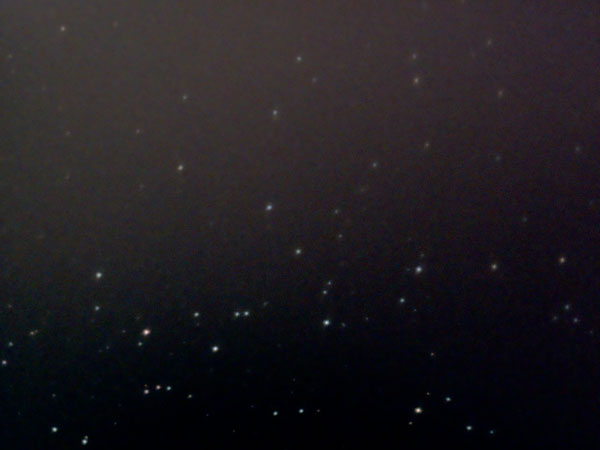 Vesp: NGC 6633 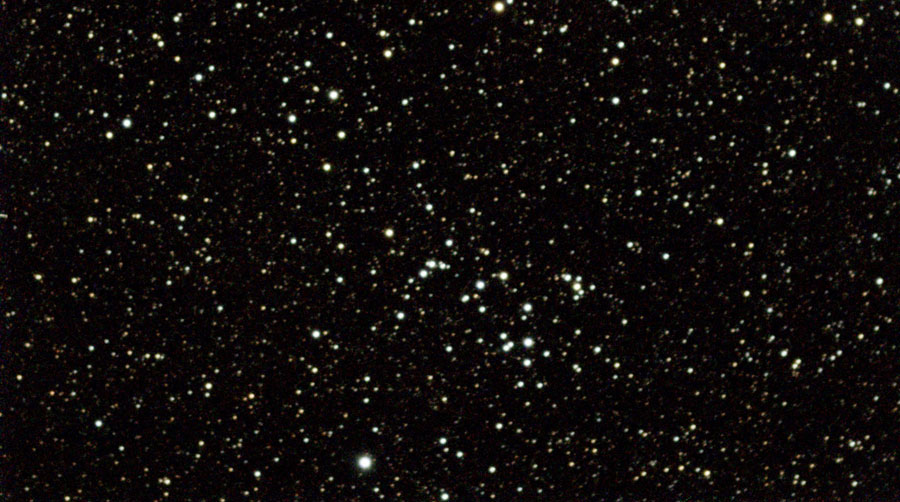 |
22 | ||
| NGC 6633 | OC | *** | 20' | eVs, Vesp | |||||
| Oph | NGC 6633 | OC | *** | 20' | eVs, Vesp | eVs: NGC 6572 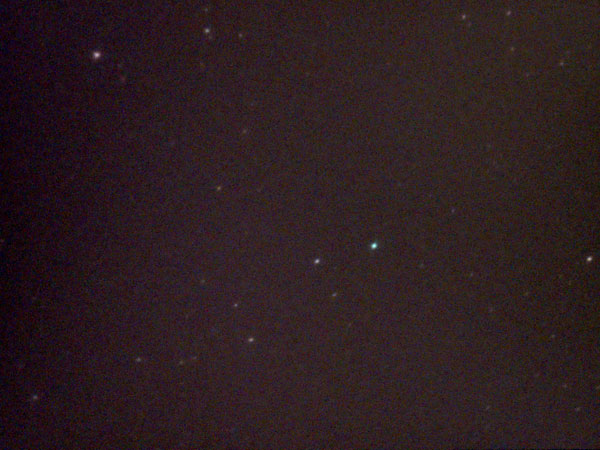 |
22 | ||
| NGC 6572 | Emerald Nebula | PN | * | 0.1' | eVs | ||||
| Ser | IC 4703 | Eagle Nebula | GN | * | 45' x 20' | eVs(2), Vesp (Pro) | ST120: M 17 and M 18 seen together Vesp: M 16, M 17, M 18 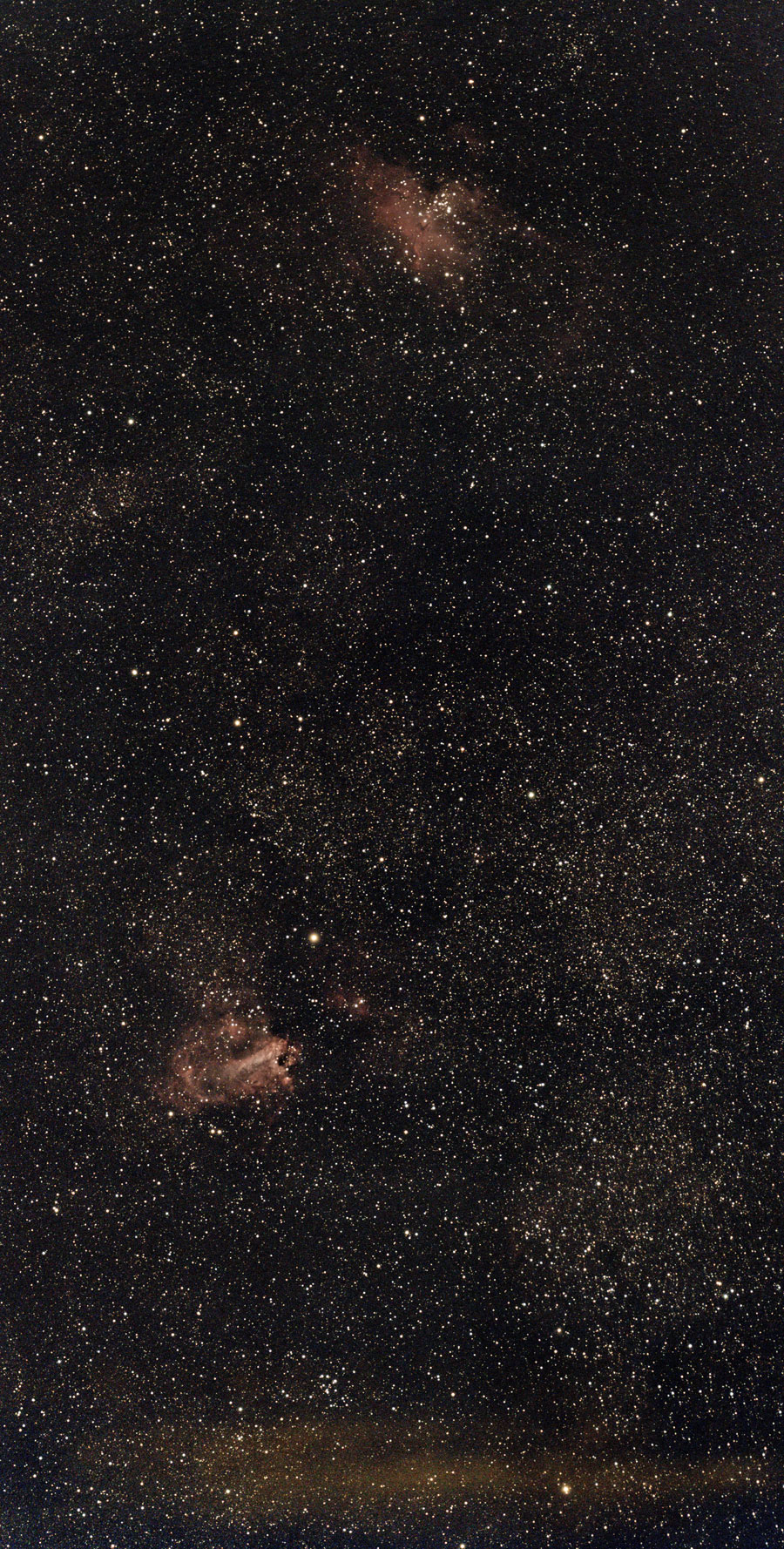 |
22, 30 | |
| M 16 | (OC in the Eagle Nebula) | OC | *** | 10' | ST120, eVs(2), Vesp (Pro) | ||||
| M 17 | Omega/Swan Nebula | GN | **** | 20' x 15' | ST120, eVs(2), Vesp (Pro) | ||||
| M 18 | OC | * | 8' | ST120, eVs, Vesp (Pro) | |||||
| Ser | NGC 6645 | OC | 15' | 22, 30 | |||||
| M 17 | Omega/Swan Nebula | GN | **** | 20' x 15' | ST120, eVs(2), Vesp (Pro) | ||||
| M 18 | OC | * | 8' | ST120, eVs, Vesp (Pro) | |||||
| Scl | NGC 288 | GC | * | 6' | 24 | ||||
| NGC 253 | Sculpture Galaxy | G | *** | 20' x 4' | Seen from the edge | ||||
| Pup | M 46 | OC | *** | 20' x 15' | yes, eVs, Vesp (Pro) | eVs: M 46, NGC 2438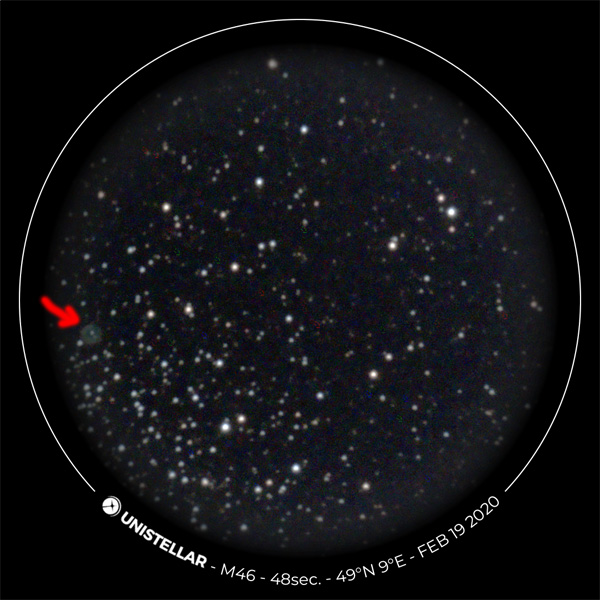 |
26 | ||
| NGC 2440 | PN | * | 0.3' | ||||||
| Pup | M 93 | OC | ** | 25' | yes, eVs | eVs: M 93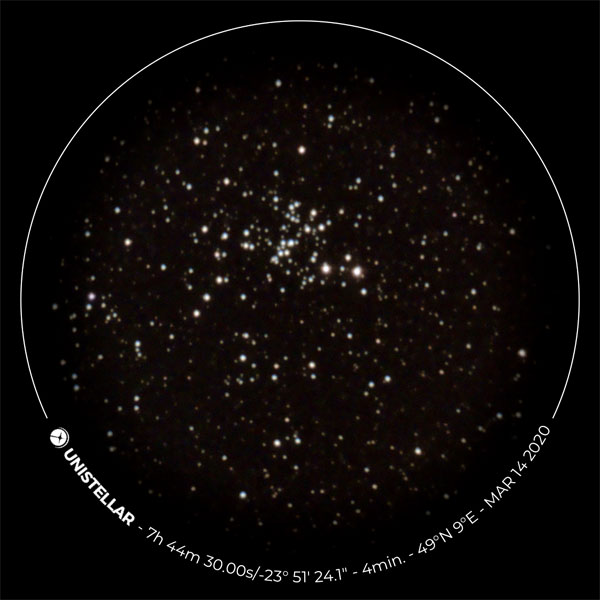 |
26 | ||
| NGC 2467 | GN | 4' | |||||||
| CMa | NGC 2359 | Thor's Helmet Nebula | GN | ** | 9' x 6' | Vesp (Pro) | Vesp: NGC 2359 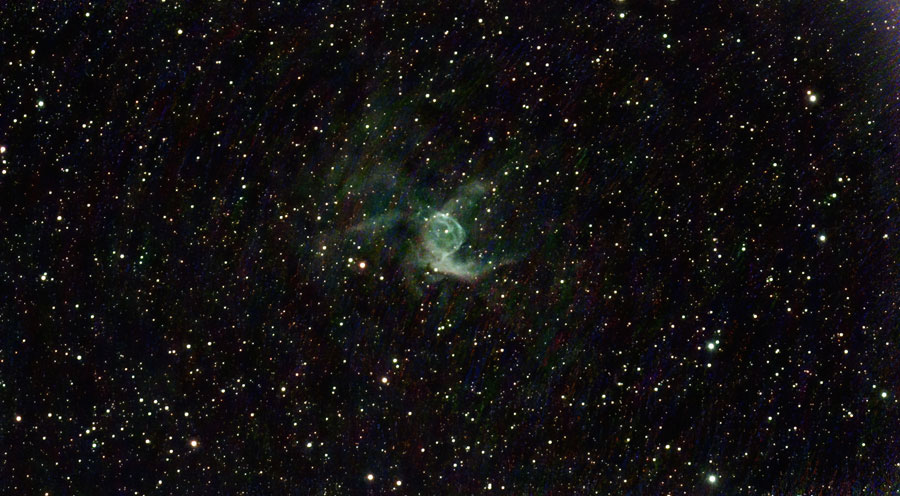 |
26 | |
| NGC 2360 | Opened Box Cluster | OC | * | 8' | |||||
| CMa | Cr 140 | OC | * | 1° | Far in the South! | 26 | |||
| NGC 2439 | OC | 5' | |||||||
| Sco | M 80 | GC | ** | 5' | Fairly in the South | ST120, eVs | M 4 and M 80 not yet seen together eVs: M 4/M 80 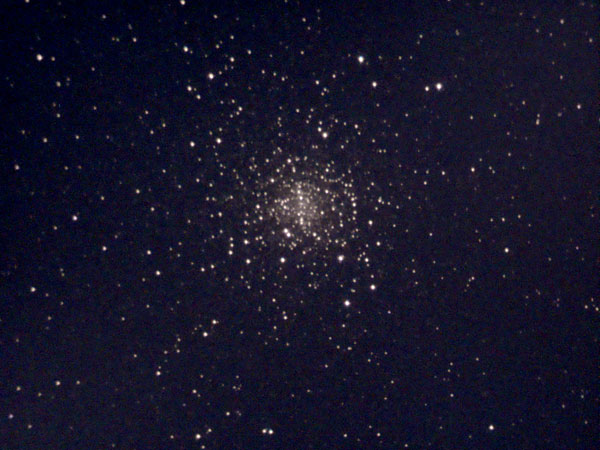 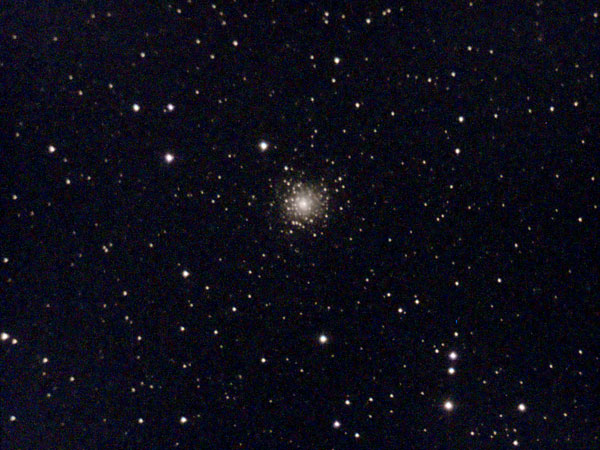 |
29 | |
| M 4 | GC | *** | 12' | Fairly in the South | ST120, eVs | ||||
| NGC 6144 | GC | 2' | ? | ||||||
| Sgr | M 21 | OC | * | 7' | ST120, eVs, Vesp (Pro) | Vesp: M 8, M 20, M 21 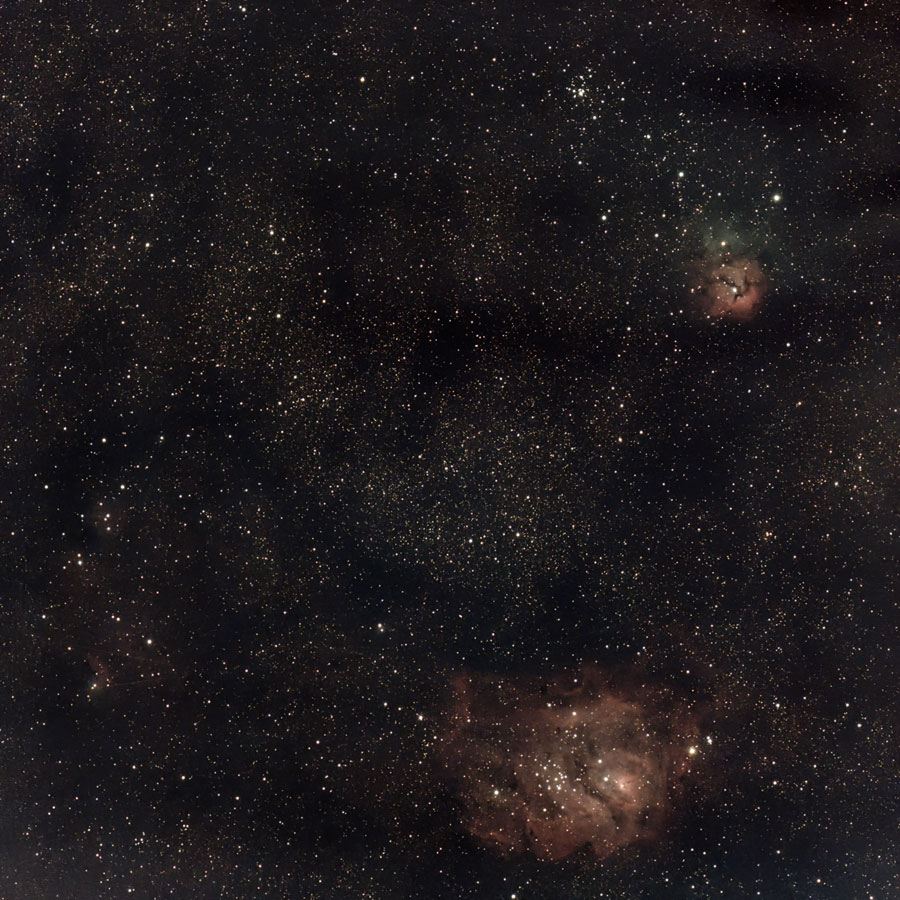 |
29 | ||
| M 20 | Trifid Nebula | GN | ** | 15' x 10' | ST120, eVs | ||||
| M 8 | (OC in Lagoon Nebula) | OC | **** | 7' | In the Lagoon Nebula | ST120, eVsVesp (Pro) | |||
| M 8 | Lagoon Nebula | GN | **** | 20' x 10' | ST120, eVsVesp (Pro) | ||||
| NGC 6544 | GC | 1,5' | |||||||
| NGC 6553 | GC | 2' x 1.5' | |||||||
| Sgr | M 6 | Butterfly Cluster | OC | **** | 25' x 20' | Fairly in the South | eVs | Too far apart for 4°; eVs: M 6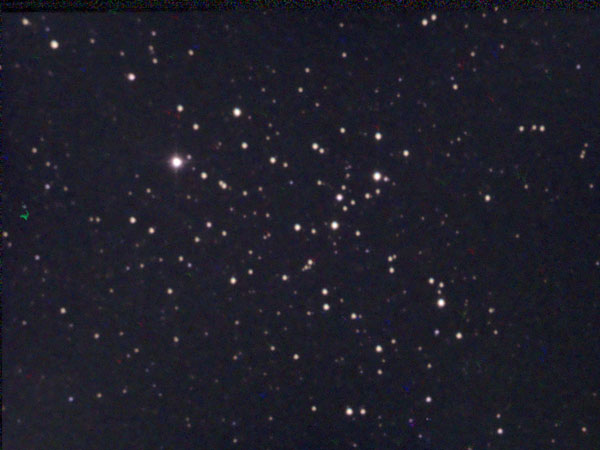 |
29, 30 |
| M 7 | OC | **** | 80' | Fairly in the South | eVs | ||||
| Sgr | M 19 | GC | ** | 3' x 2.5' | ST120, eVs | eVs: M 19 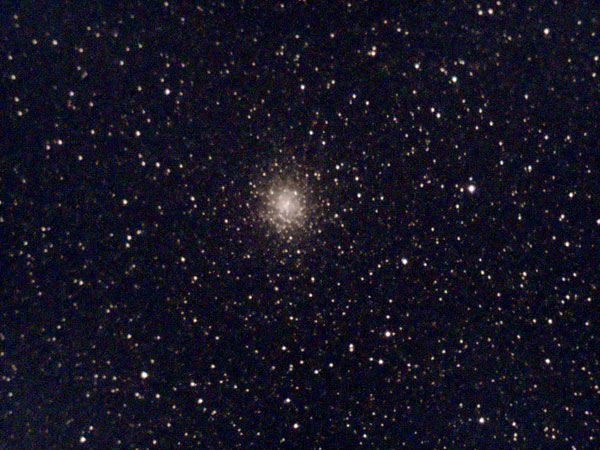 |
29 | ||
| M 62 | GC | * | 3.5' | Perhaps too far in the South | eVs | ||||
| Ser | M 25 | OC | *** | 30' | ST120, eVs | Too far apart for 4° eVs: M 24/25 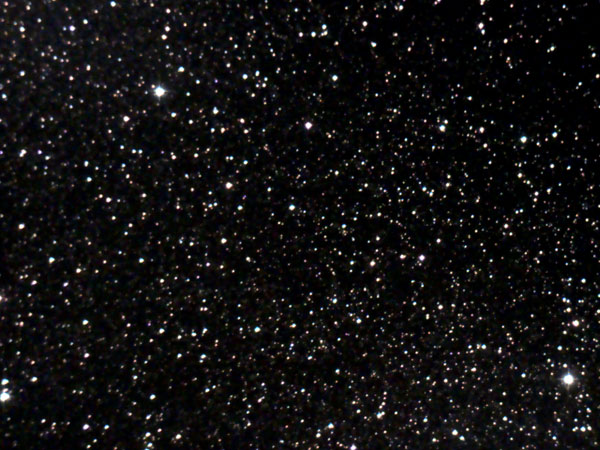 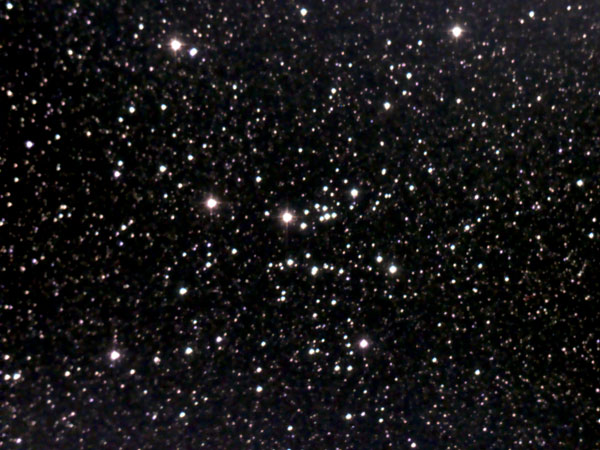 |
30 | ||
| M 18 | OC | * | 8' | ST120, eVs, Vesp (Pro) | |||||
| M 24 | Small Sagittarius Cloud | SW | *** | 1.5° x 0.5° | ST120, eVs | ||||
| Sgr | M 22 | GC | **** | 9' | ST120, eVs | More than 4° apart eVs: M 22/28  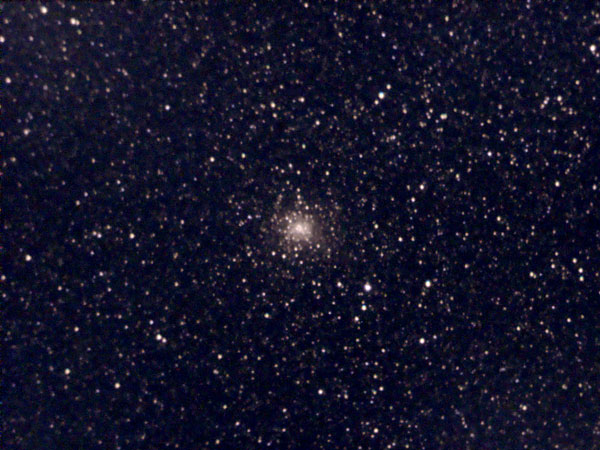 |
30 | ||
| M 28 | GC | ** | 5' | ST120, eVs | |||||
| Sgr | M 54 | GC | * | 2.5' | ST120, eVs | More than 4° apart eVs: M 54/M70 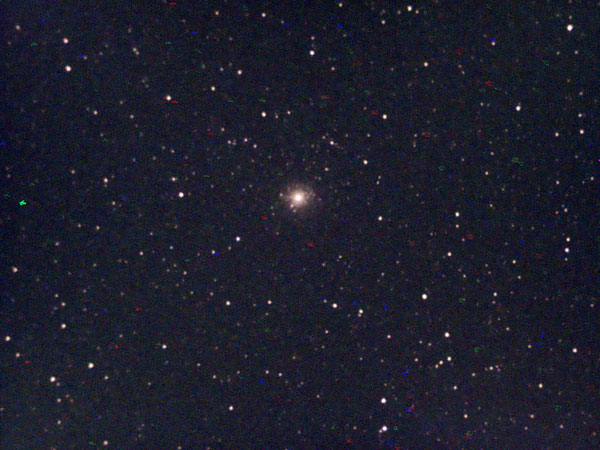 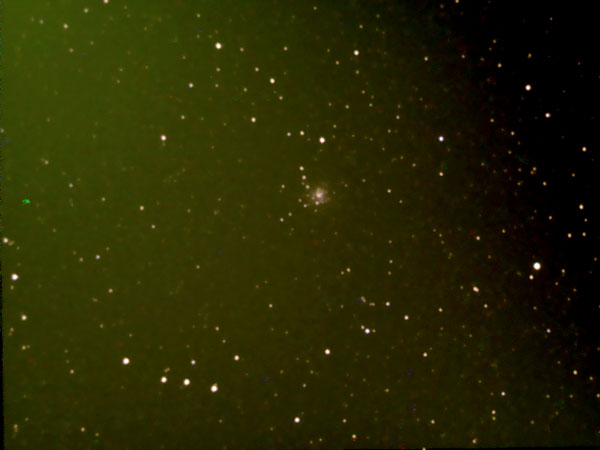 |
30 | ||
| M 70 | GC | * | 3' | ST120, eVs | |||||
| Sgr | M 70 | GC | * | 3' | ST120, eVs | More than 4° apart eVs: M 69/70 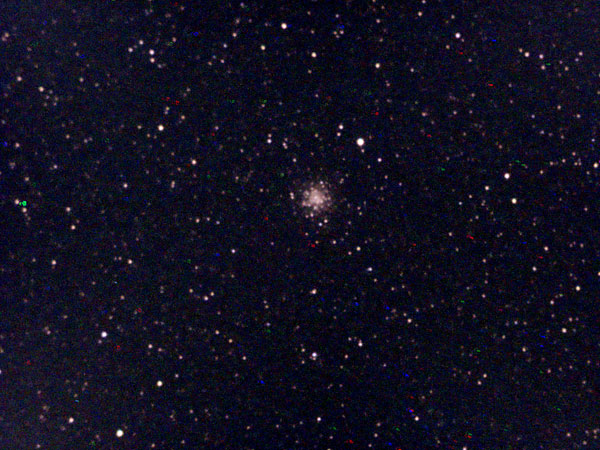  |
30 | ||
| M 69 | GC | * | 2.5' | ST120, eVs |
Legend
*) Page in Deep Sky Reiseatlas (see references)
PN = planetary nebula, GE = galactic emission nebula, GR = galactic reflection
nebula, OC = open star cluster, GC = globular star cluster, DS = double star,
SP = star pattern, SC = star cloud
ST120: many first observations were made with the StarTravel 120/600 (ST120)
refractor
AI = Atik Infinity, PS72 = Omegon Photoscope 72/432, SM = StellarMate computer
eVs = eVscope (2), Vesp = Vespera, BI = binoculars
yes = observed with any telescope from my equipment
References
Books
- Michael Feiler & Philip Novak (2023). Deep Sky Reiseatlas (5th edition), Oculum Verlag (ISBN 978-3-949370-04-5)
www.oculum-verlag.de/detailview?no=608 - Ronald Stoyan (2021). Deep Sky Reiseführer (6th edition), Oculum Verlag (ISBN: 978-3-938649-72-9)
www.oculum-verlag.de/detailview?no=603 (in German)
Discussions
- Auf der Suche nach Richfield Objekten (VisuSCor): forum.astronomie.de/threads/auf-der-suche-nach-richfield-objekten.281222/#post-1432692
| 06.07.2025 |
